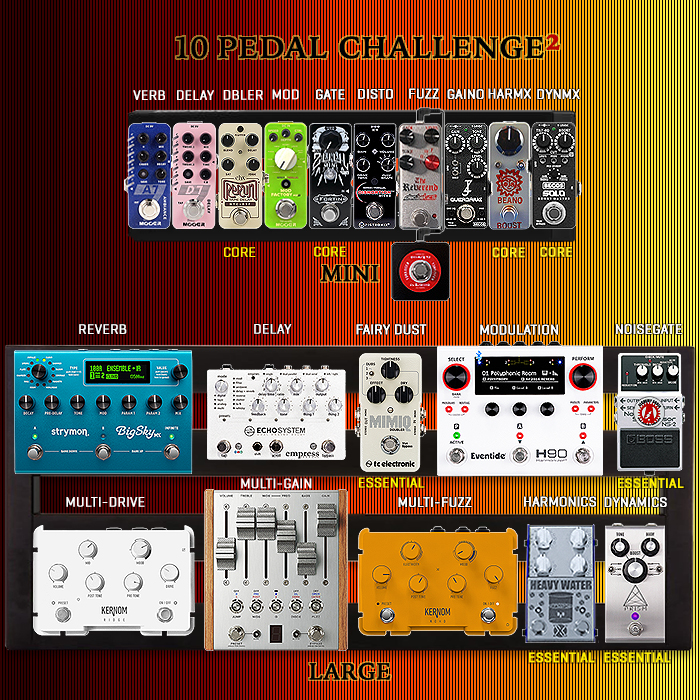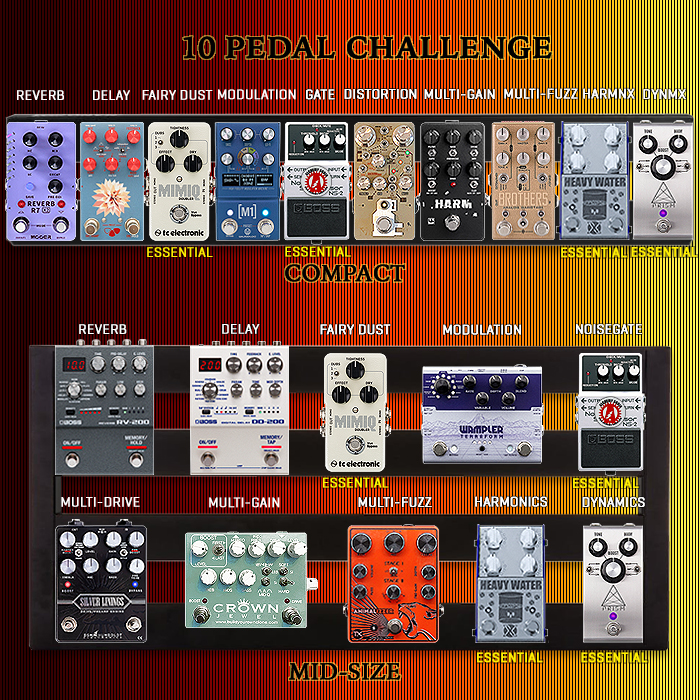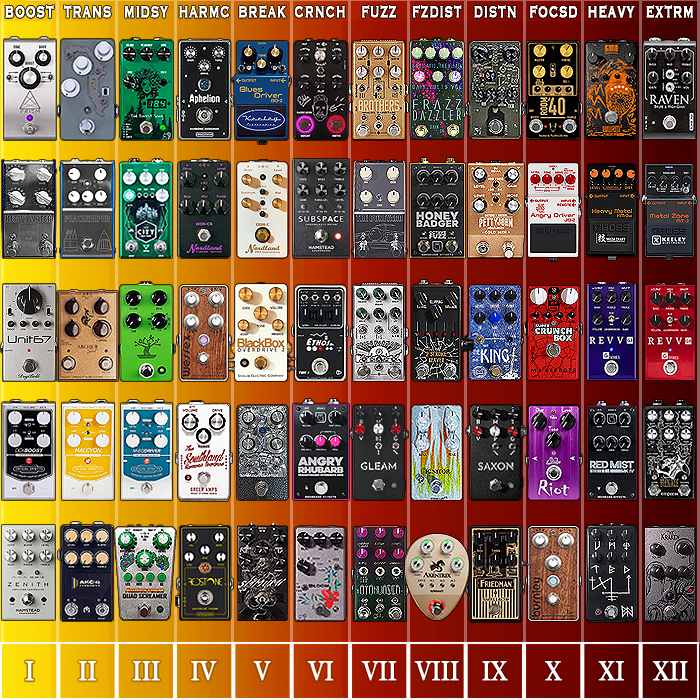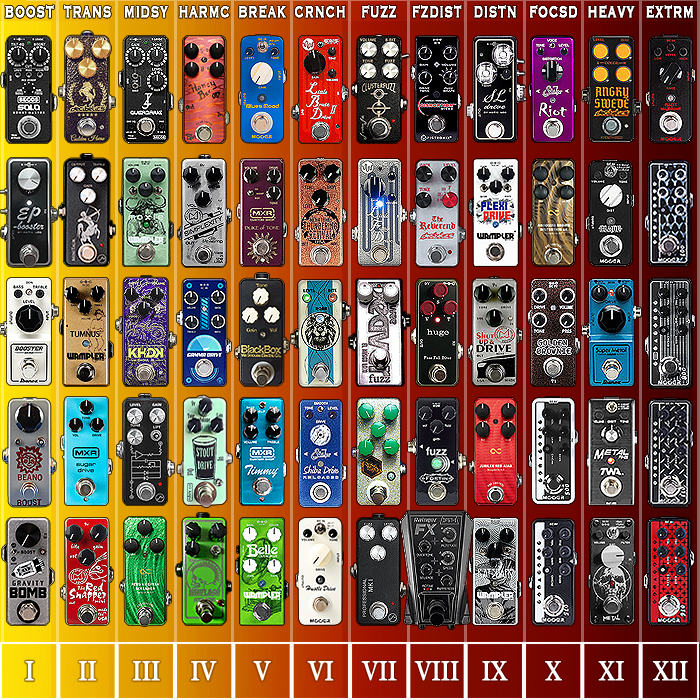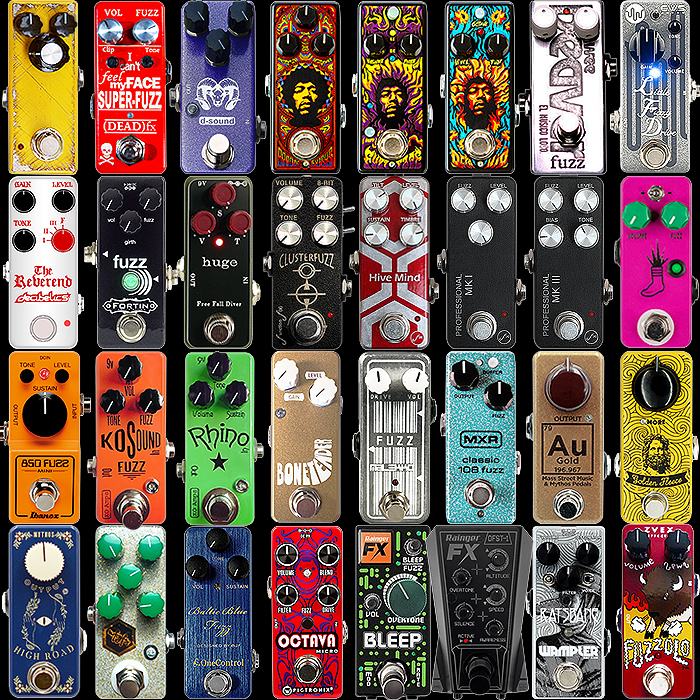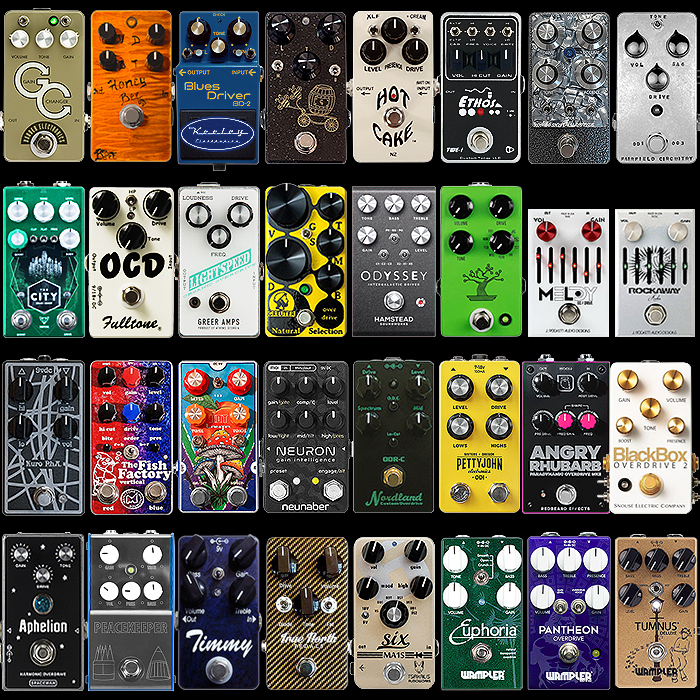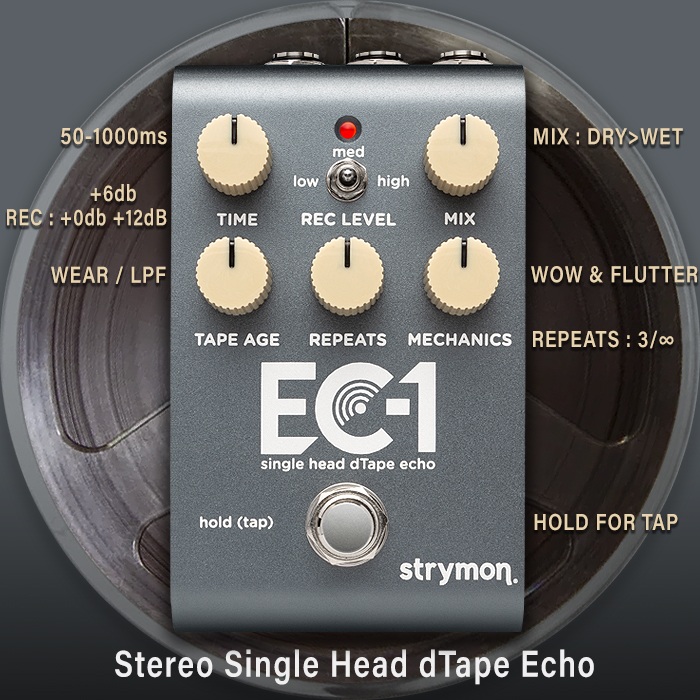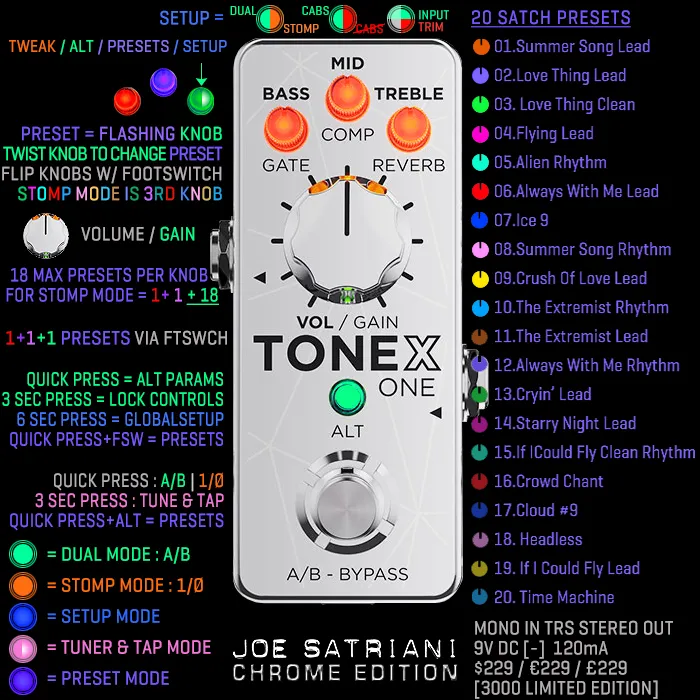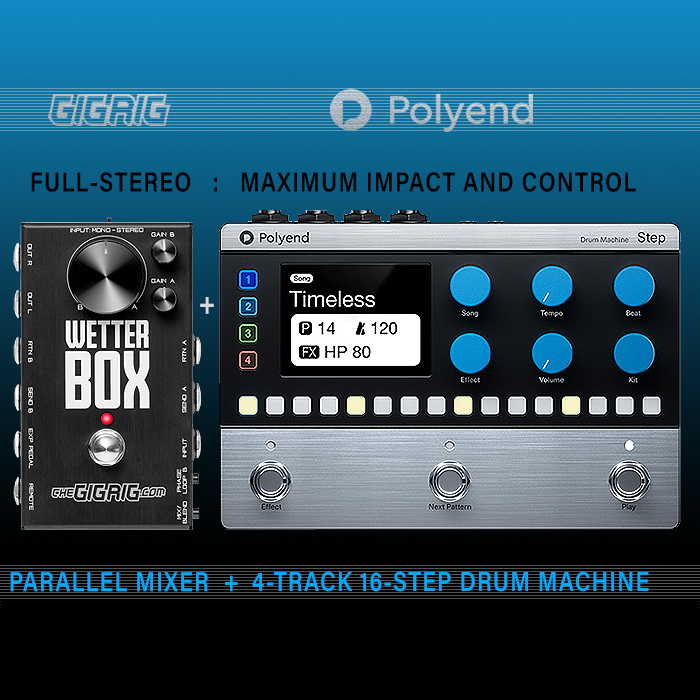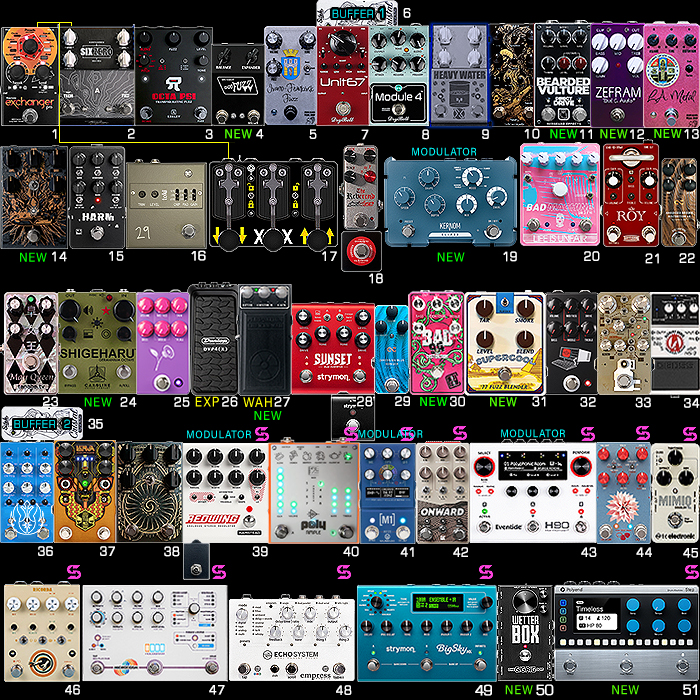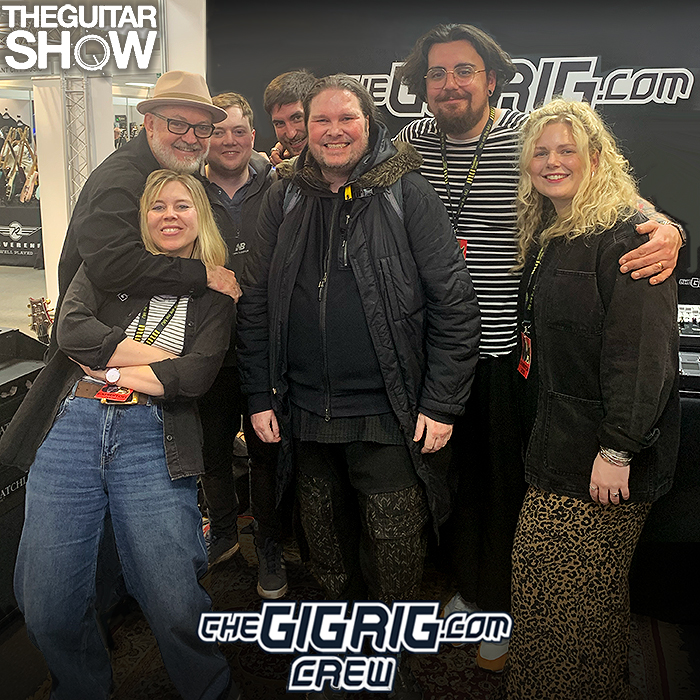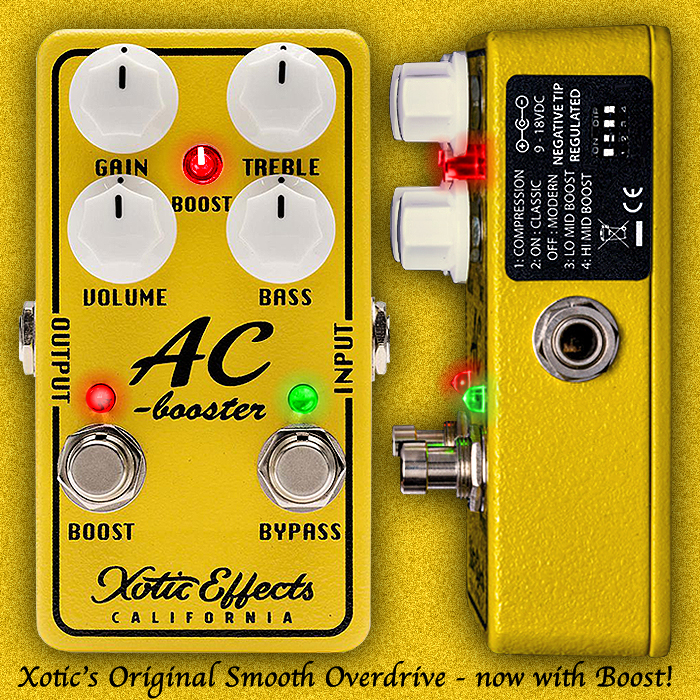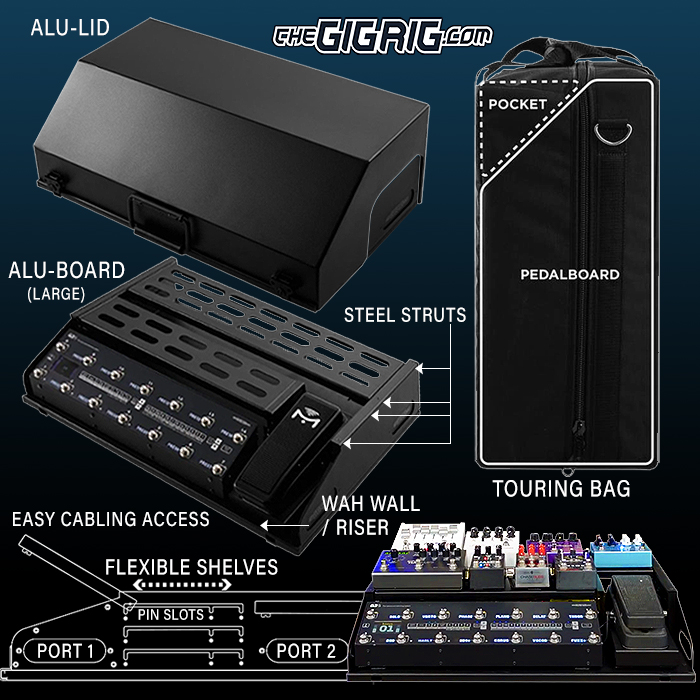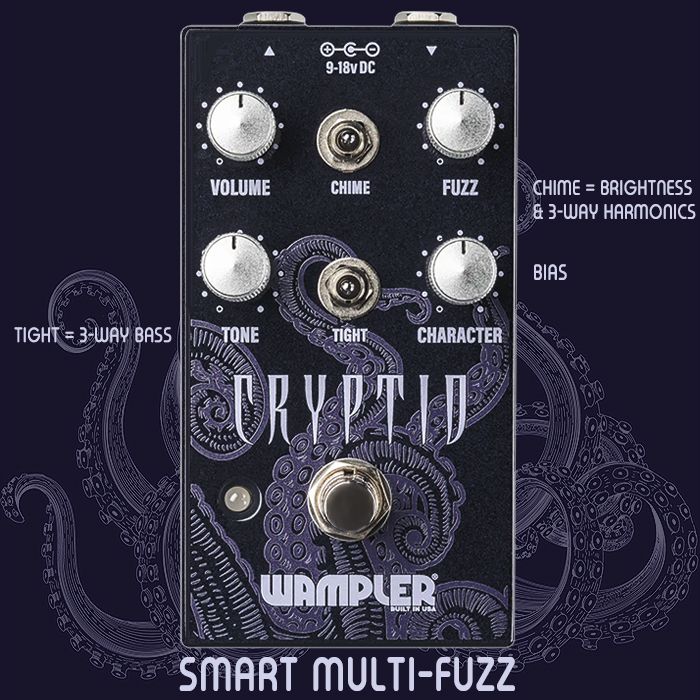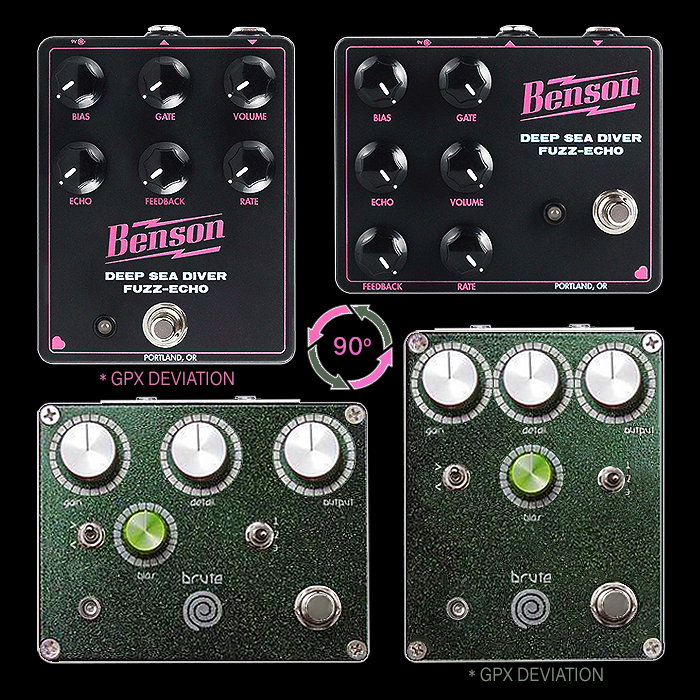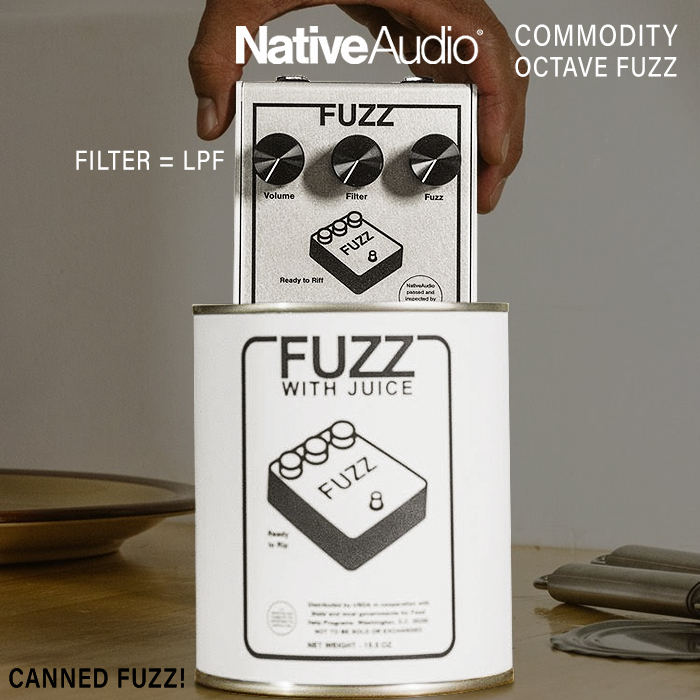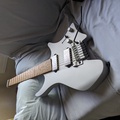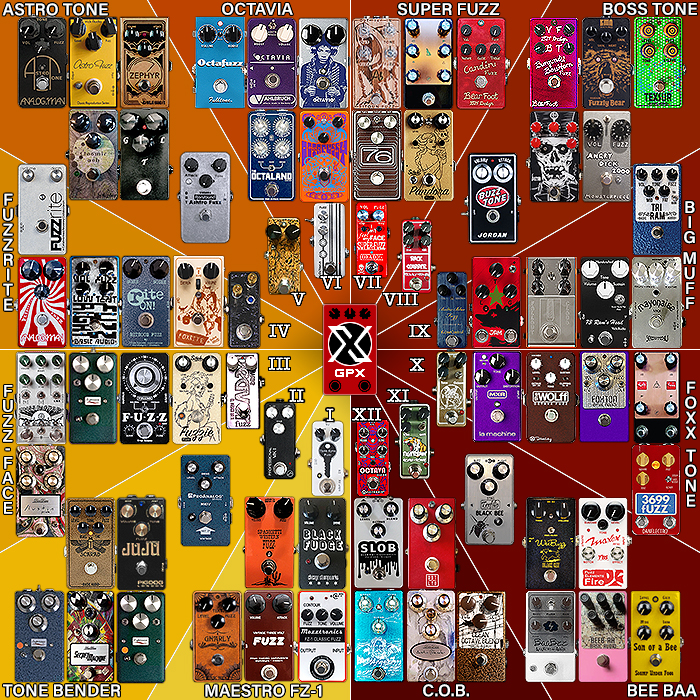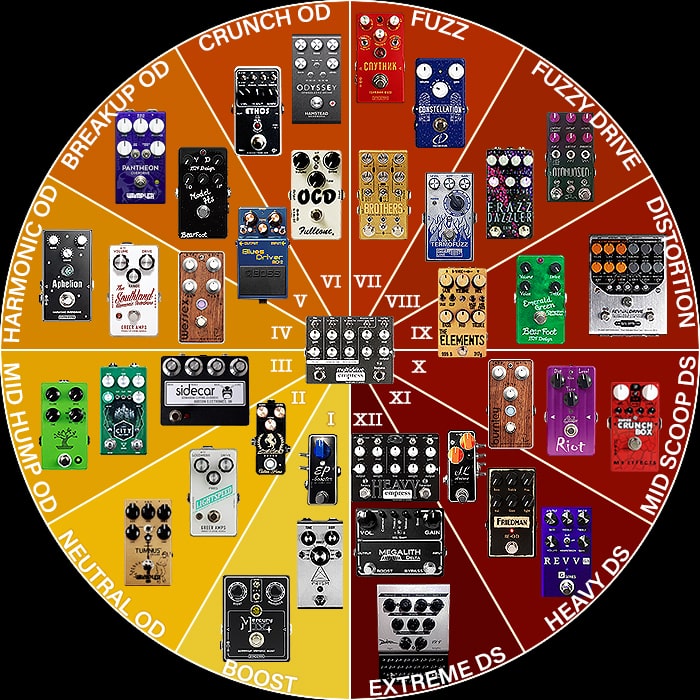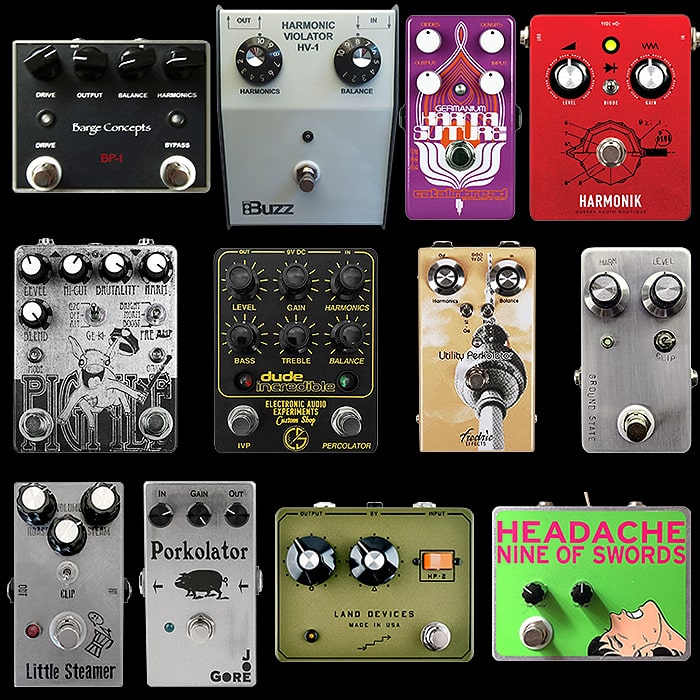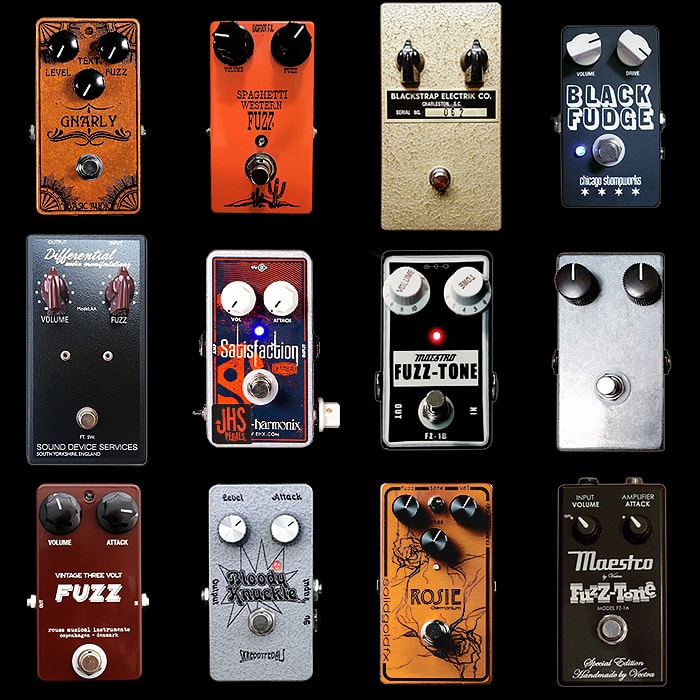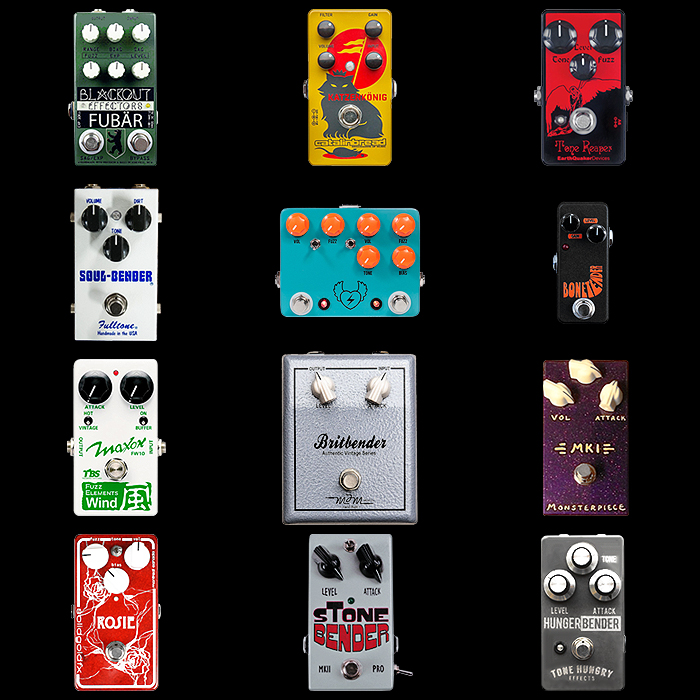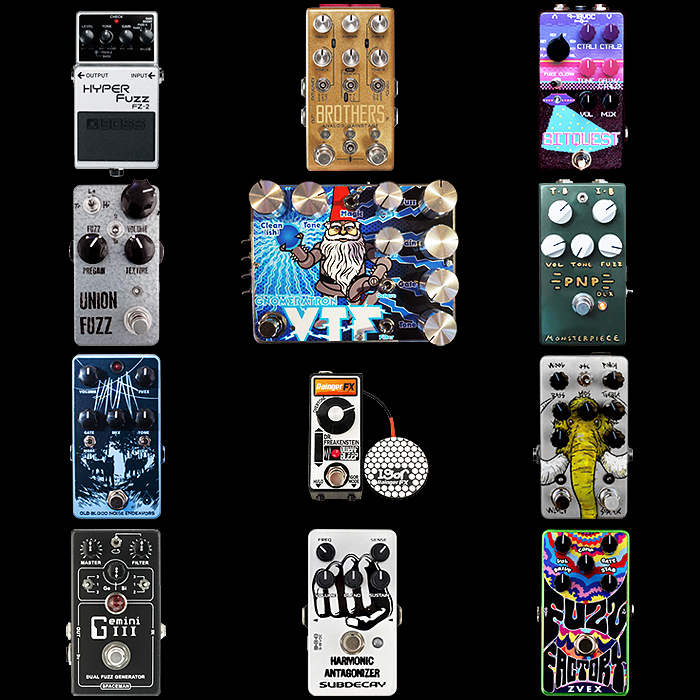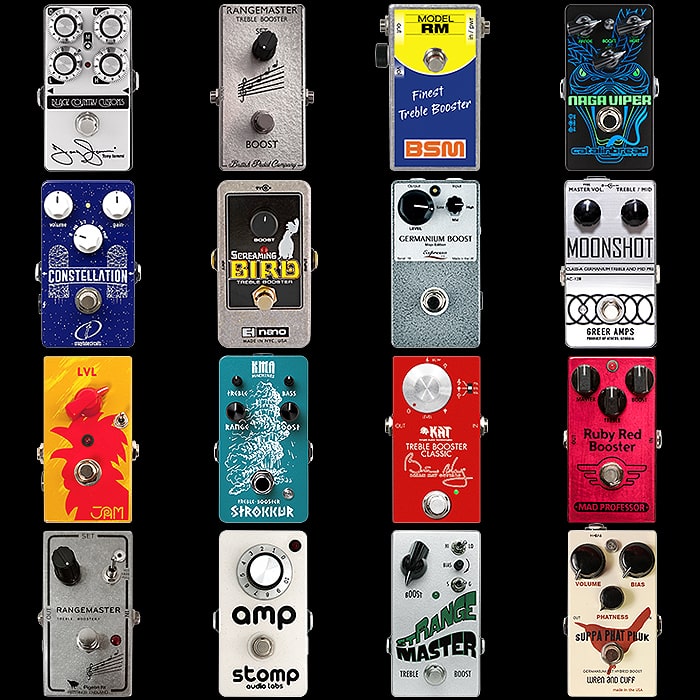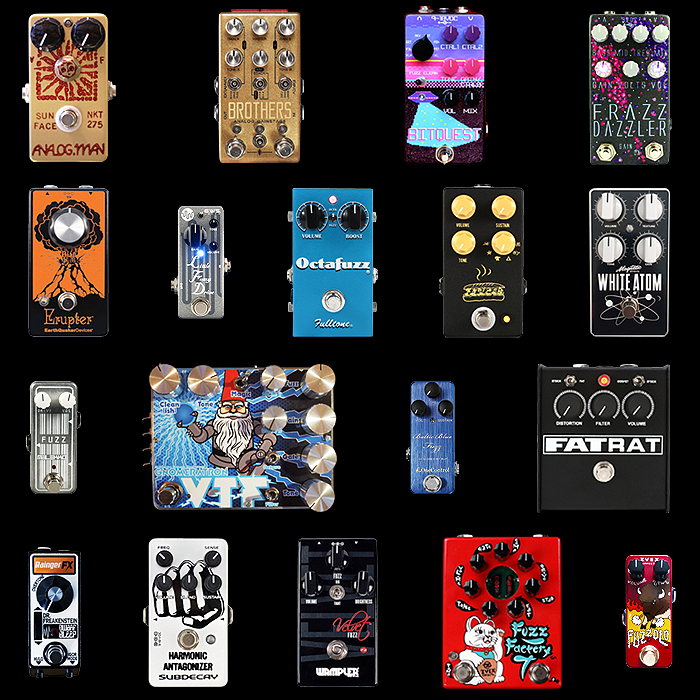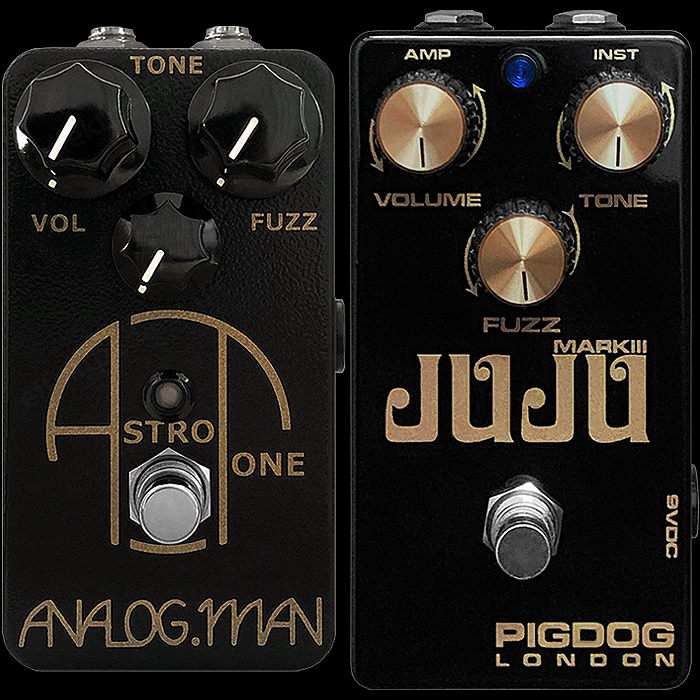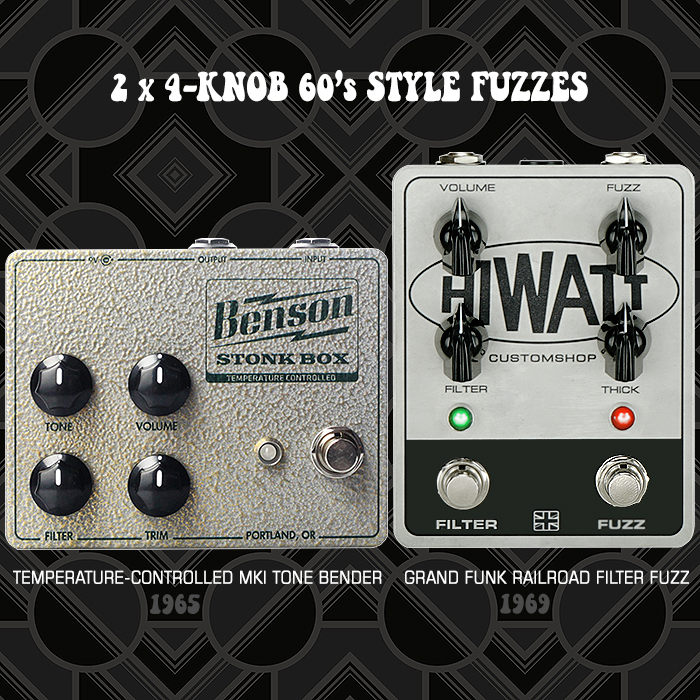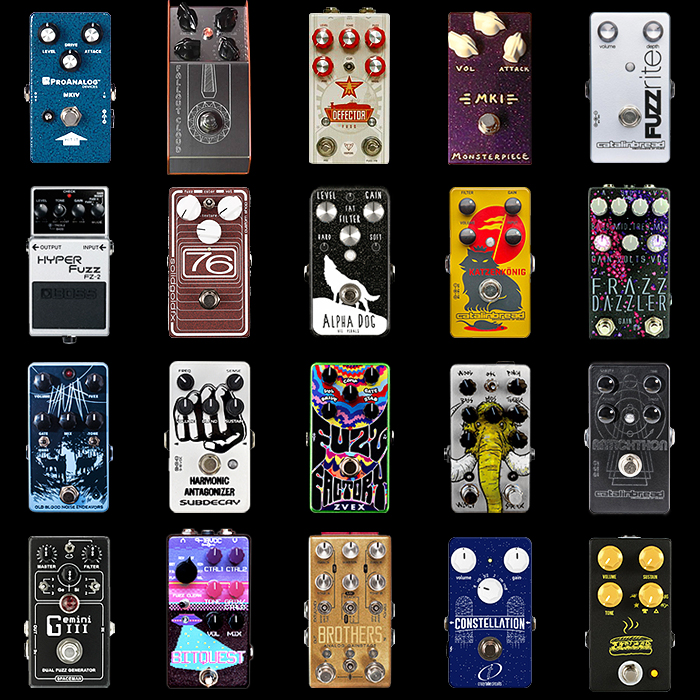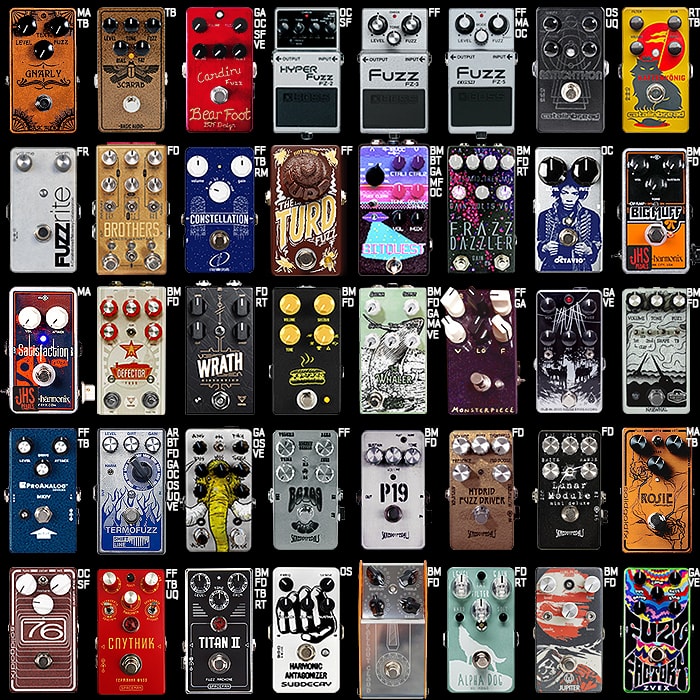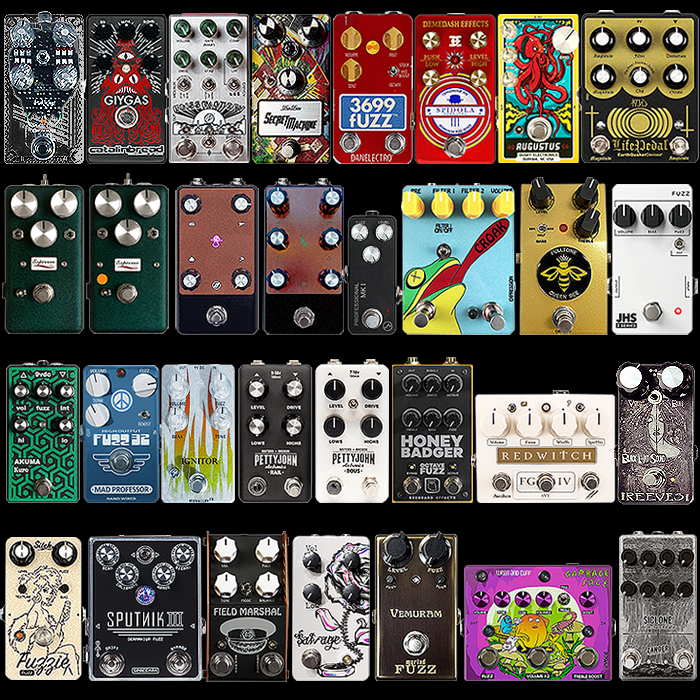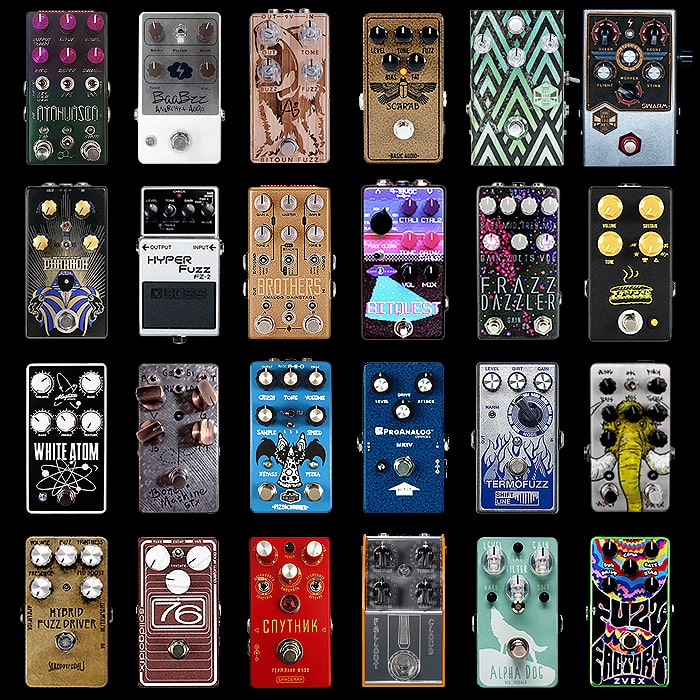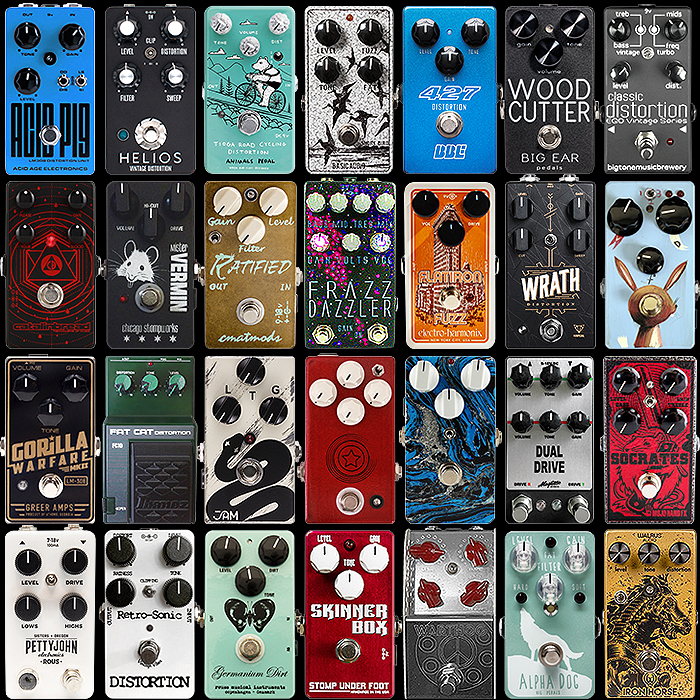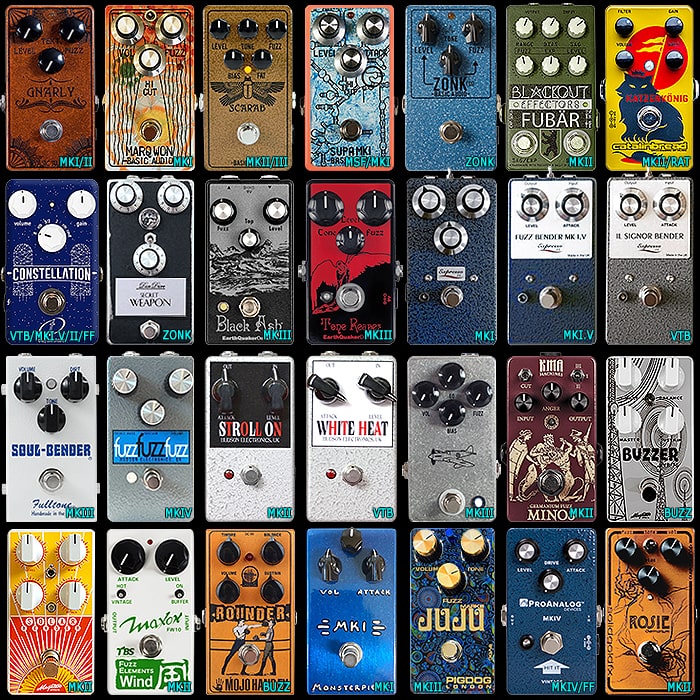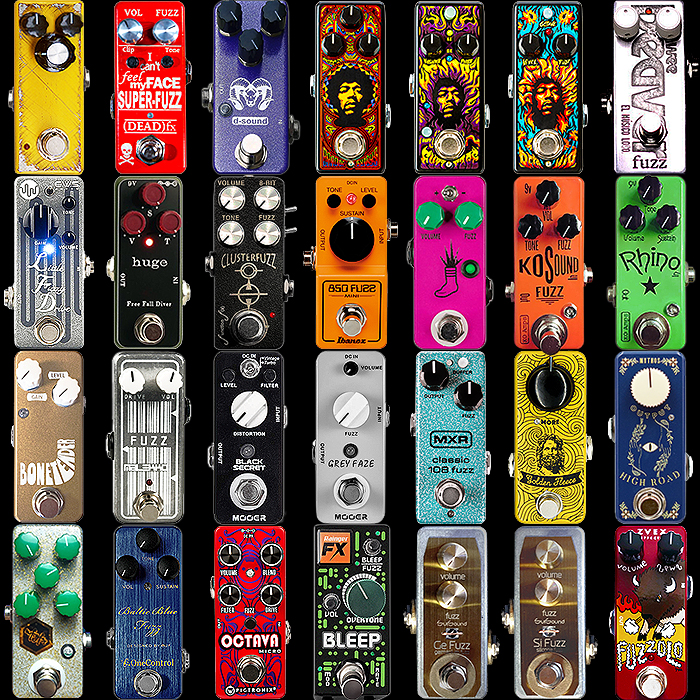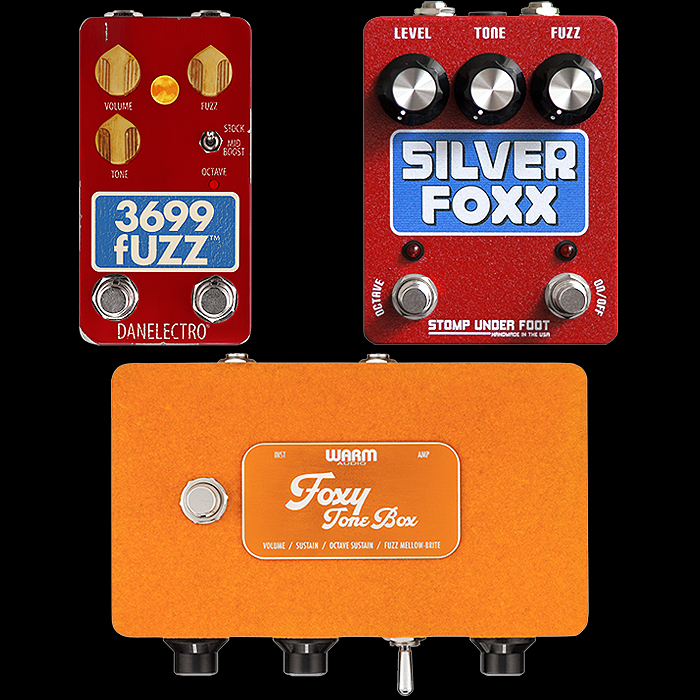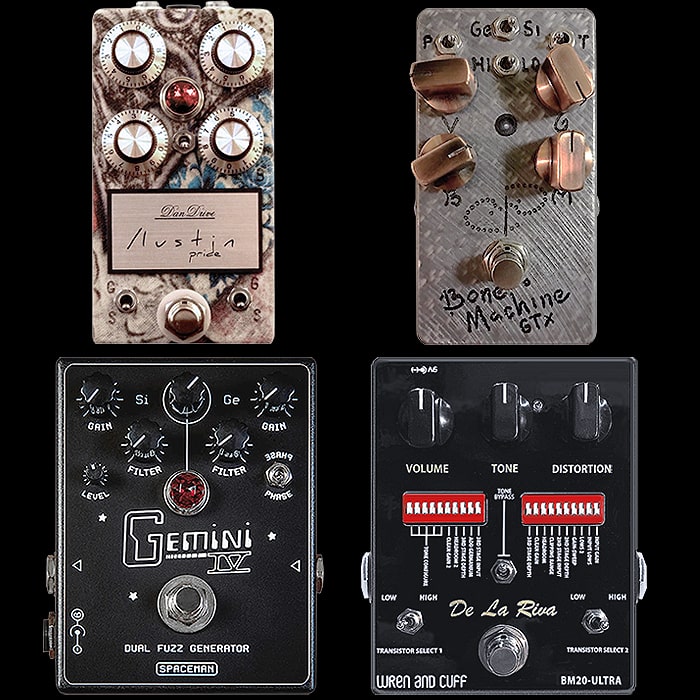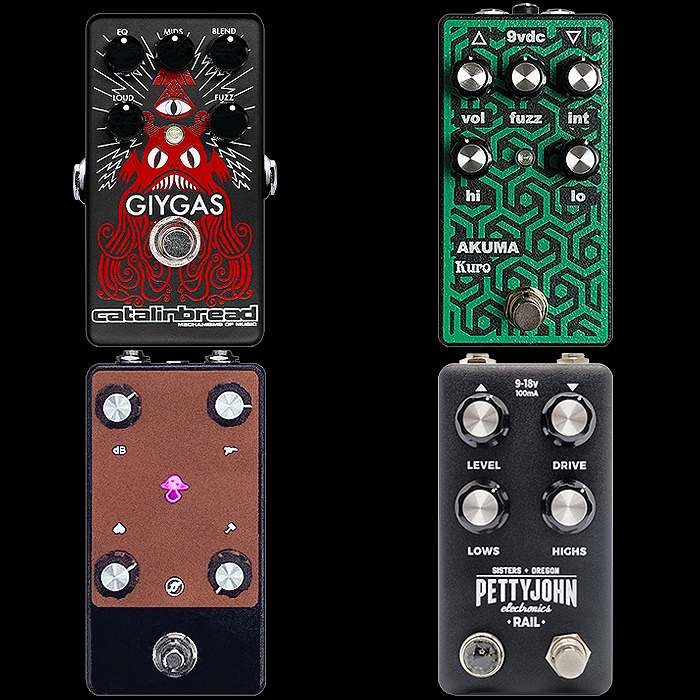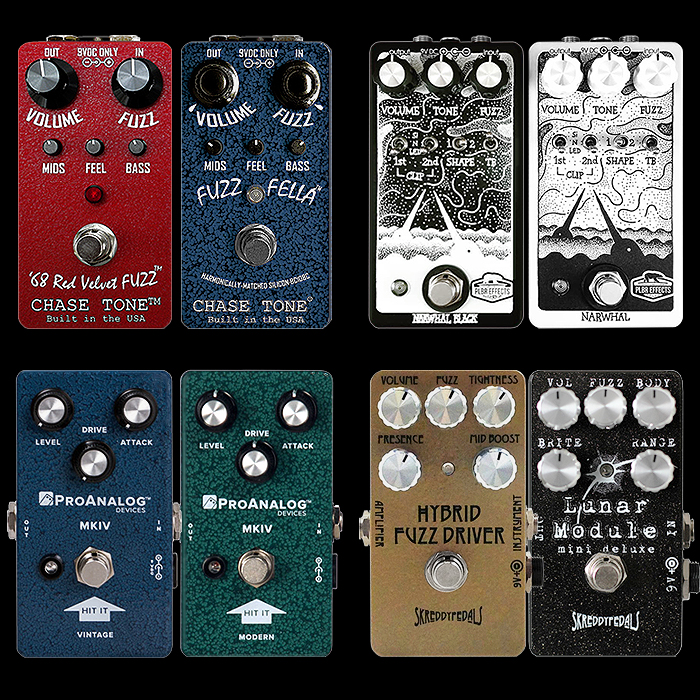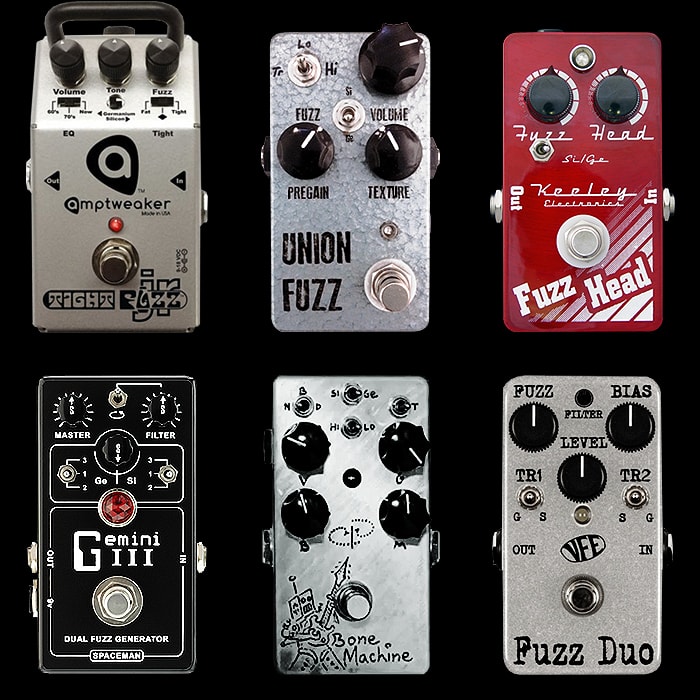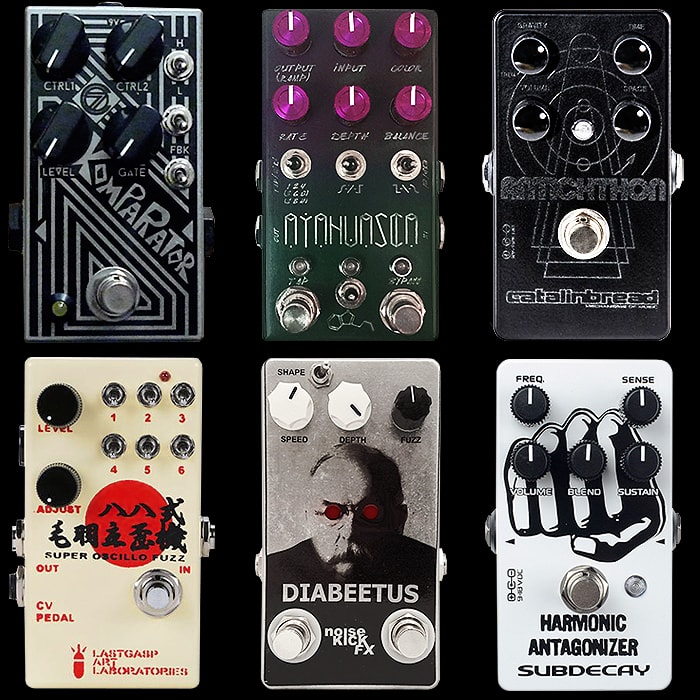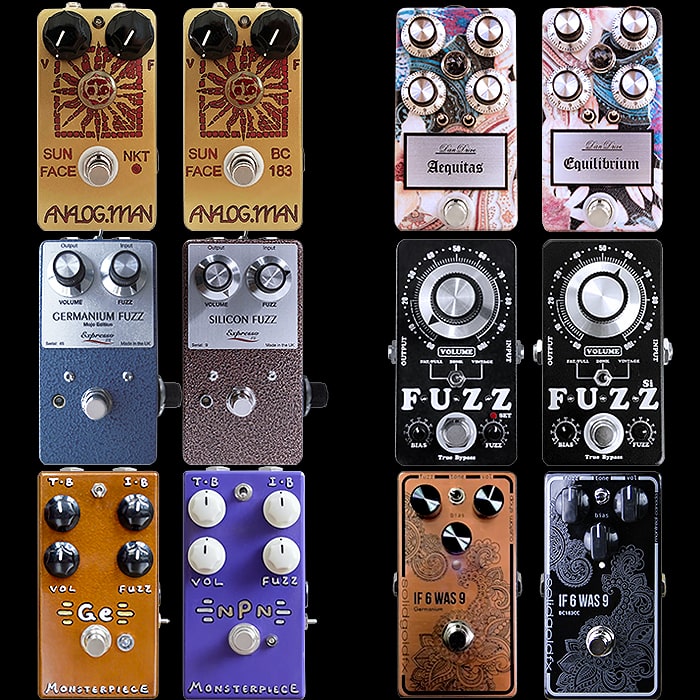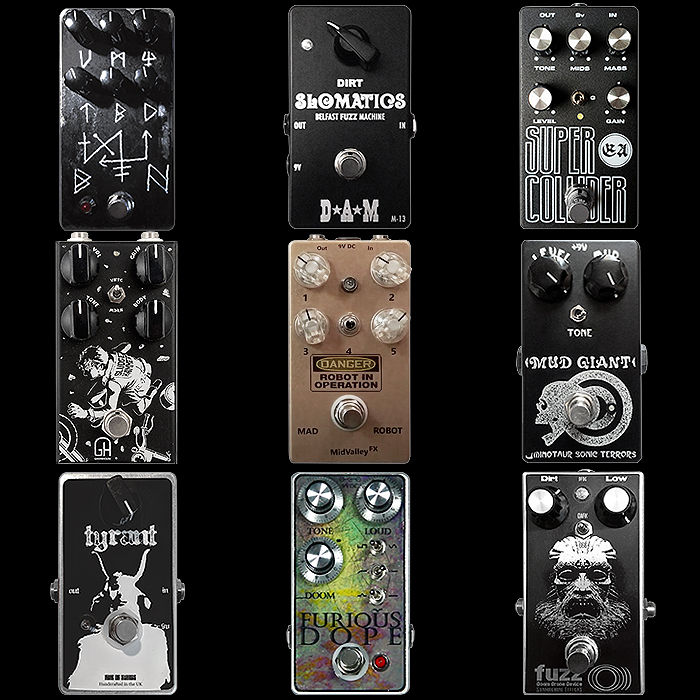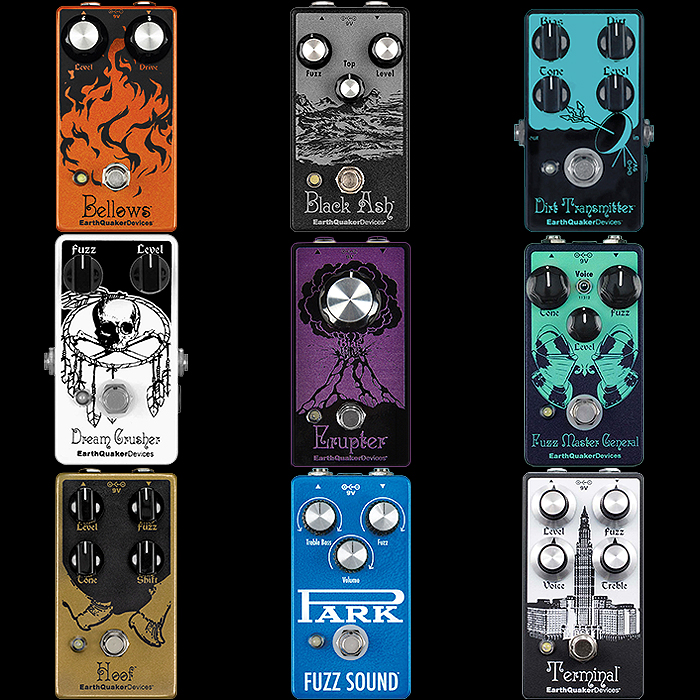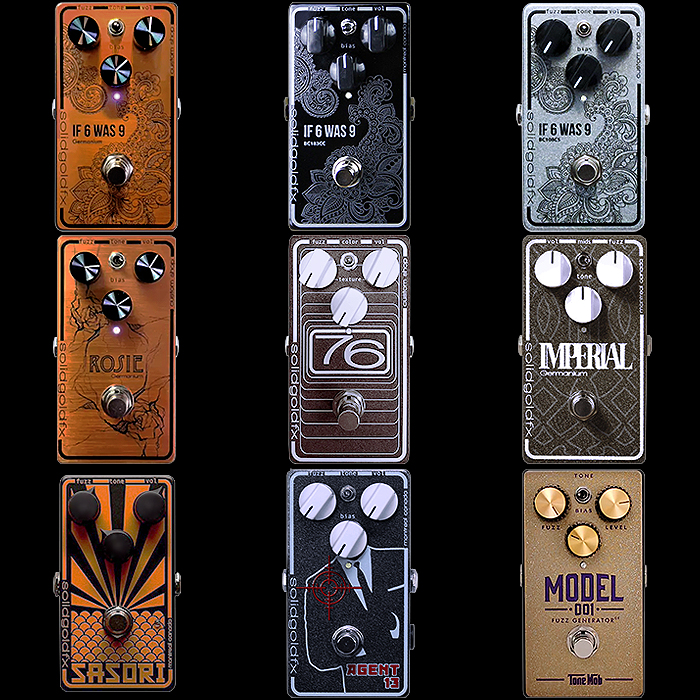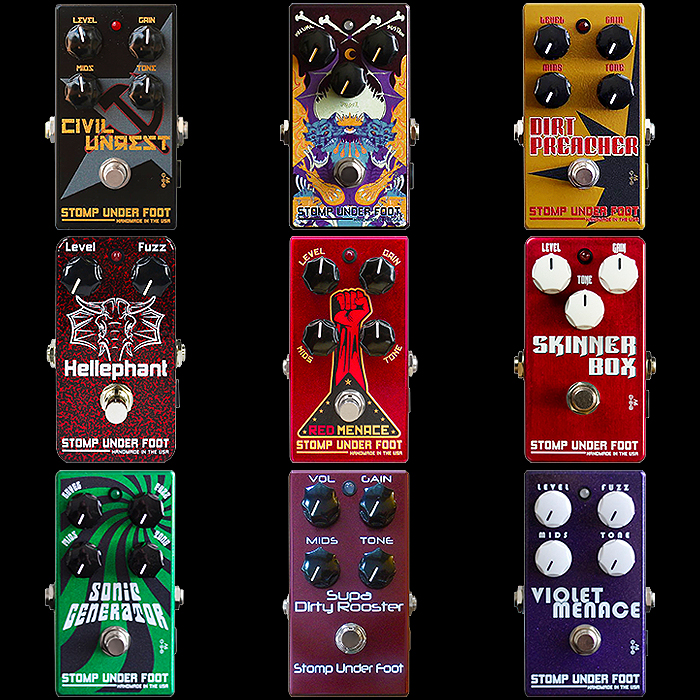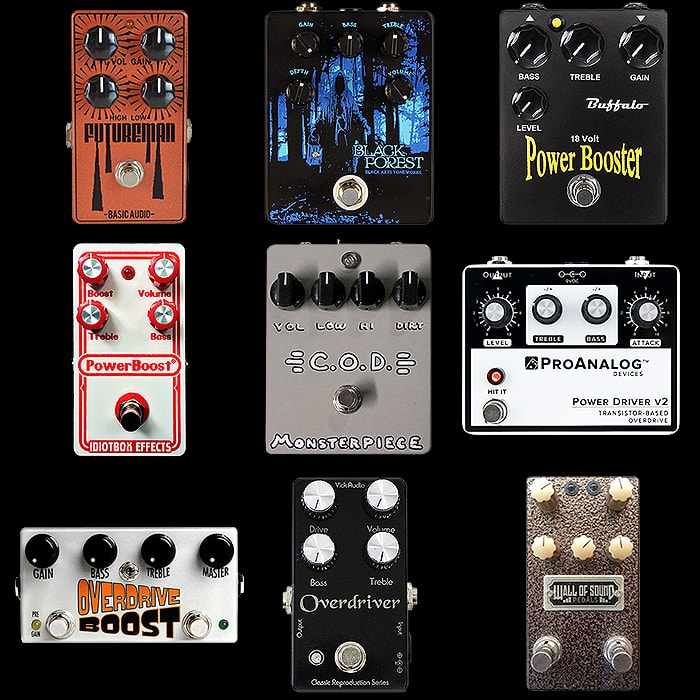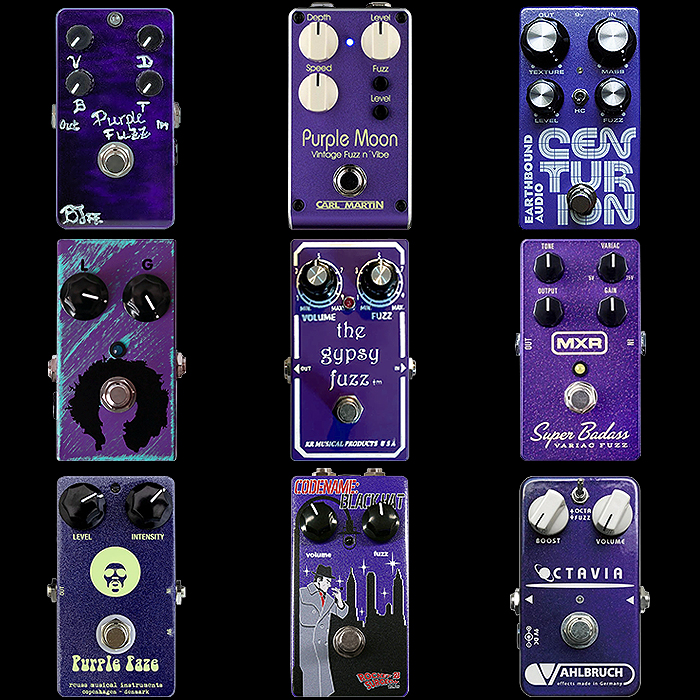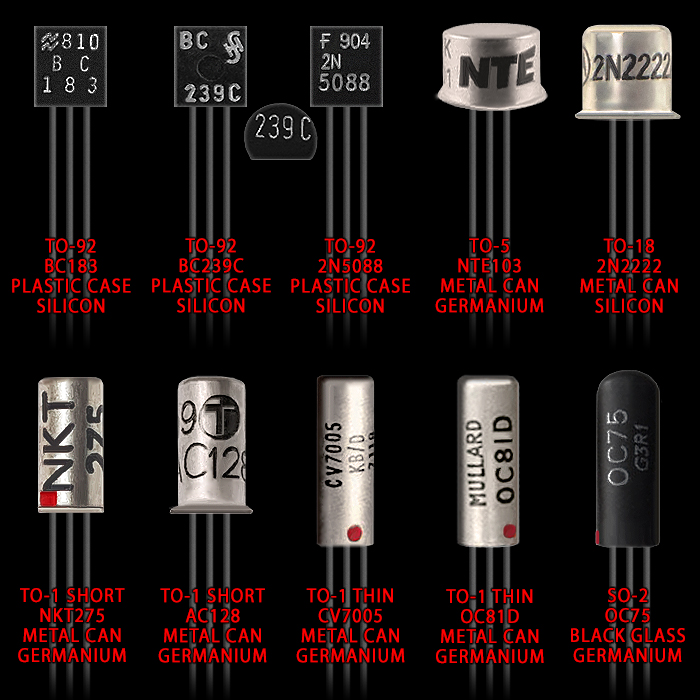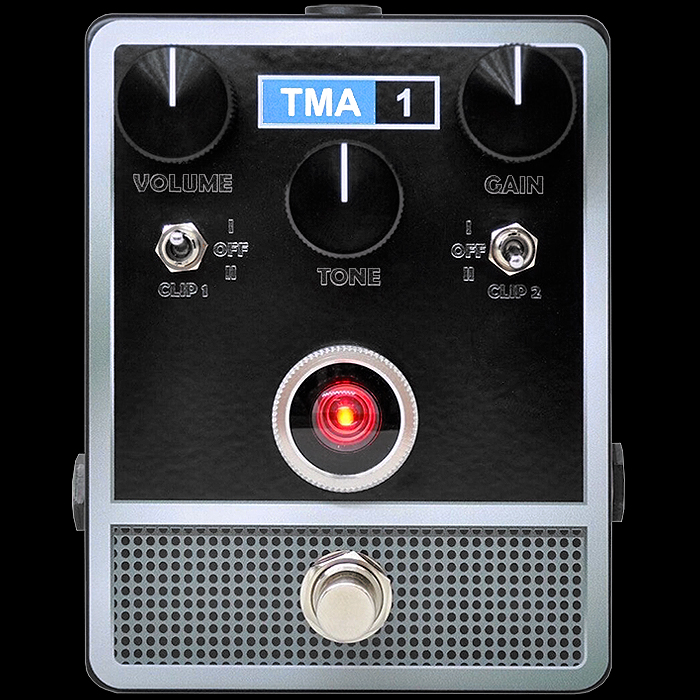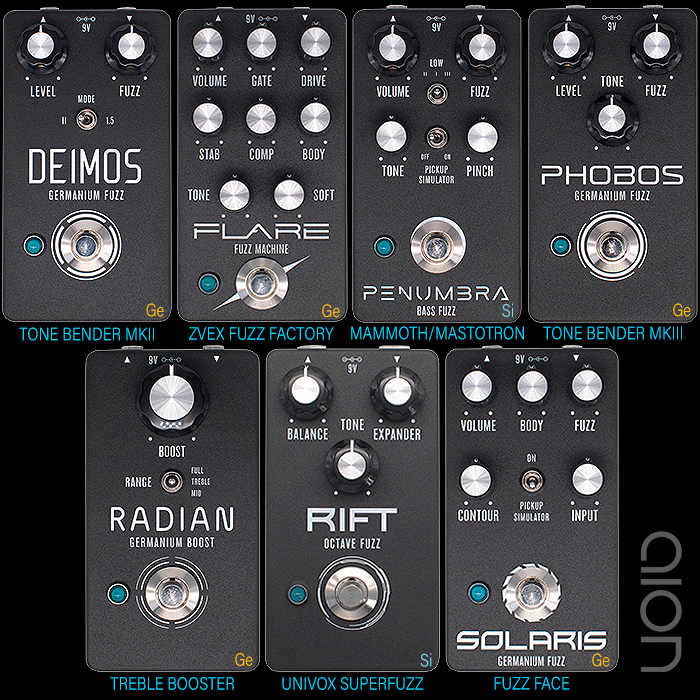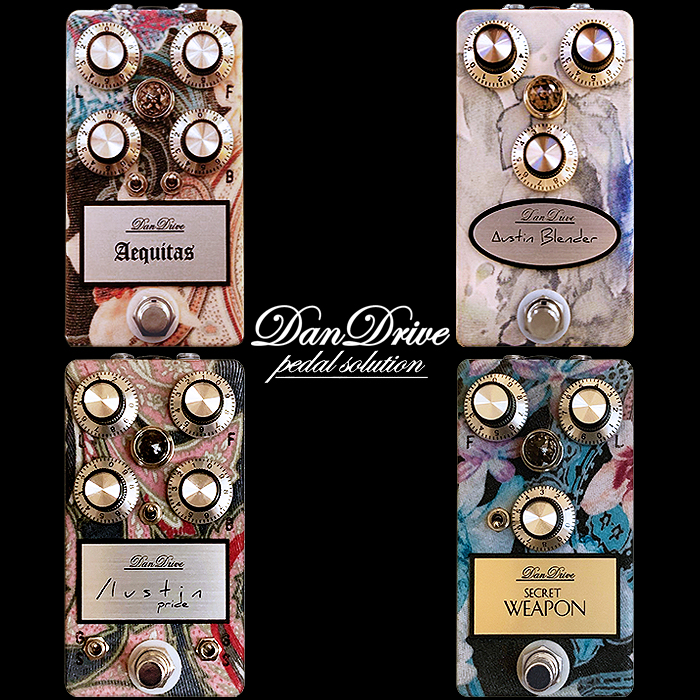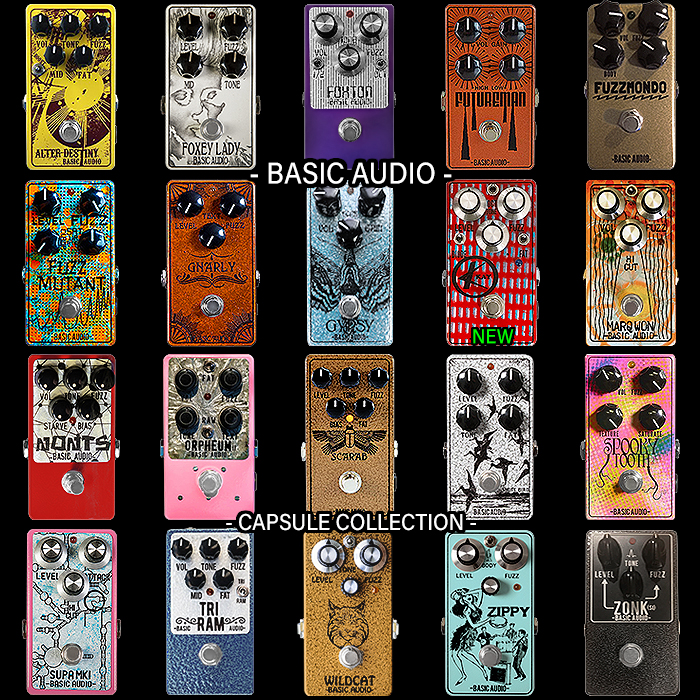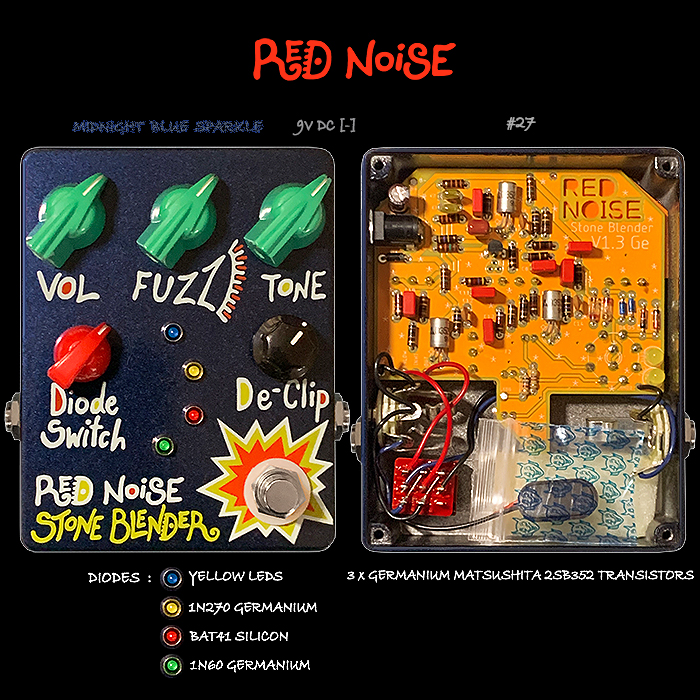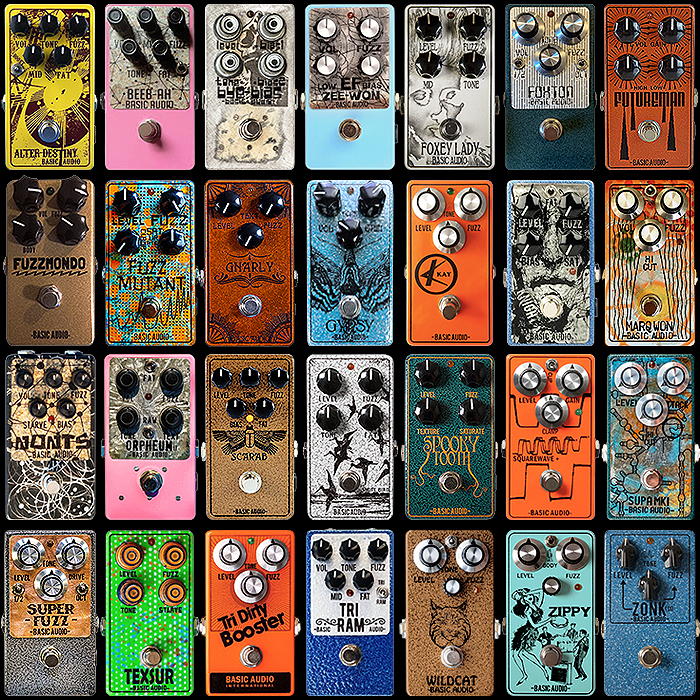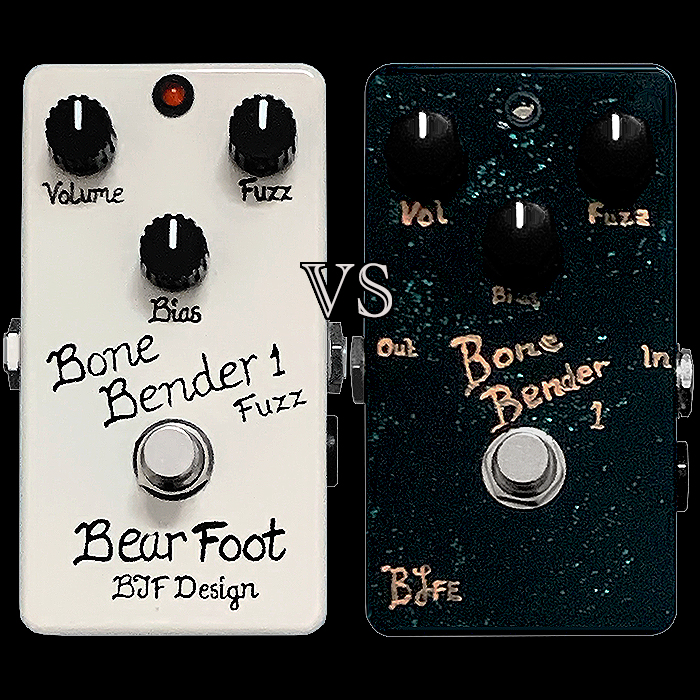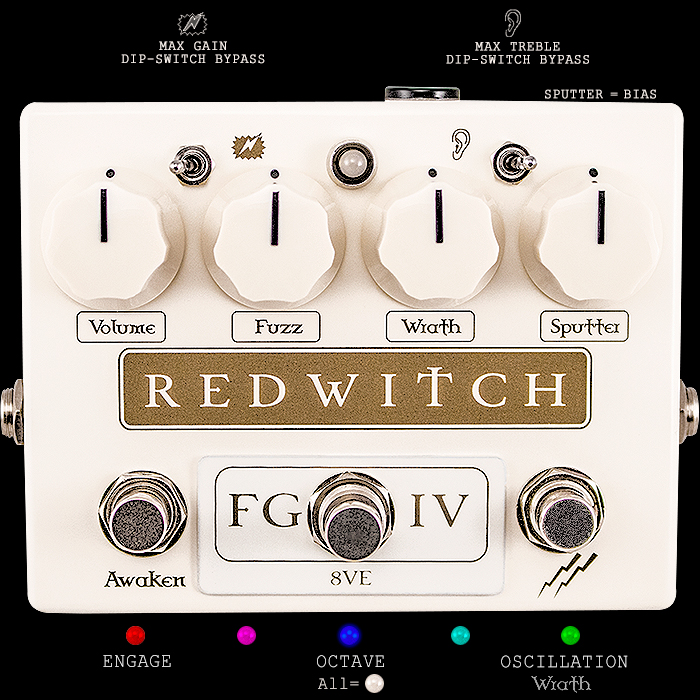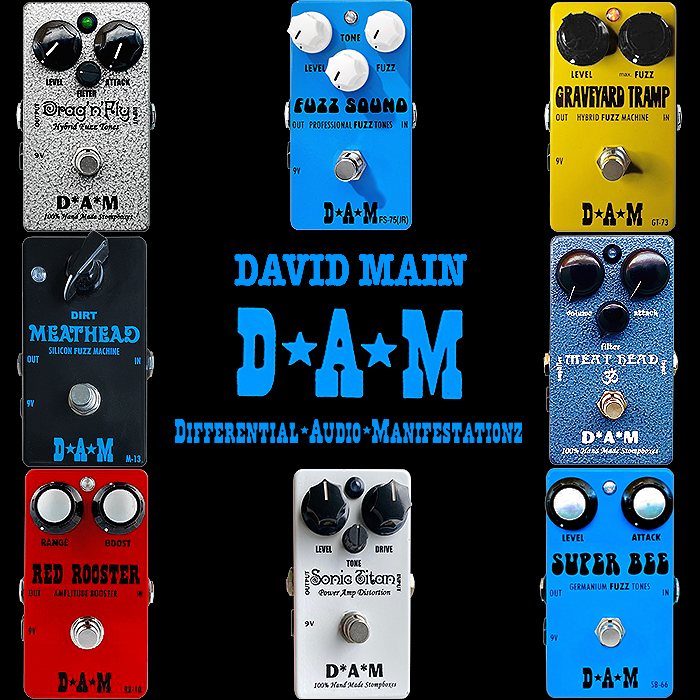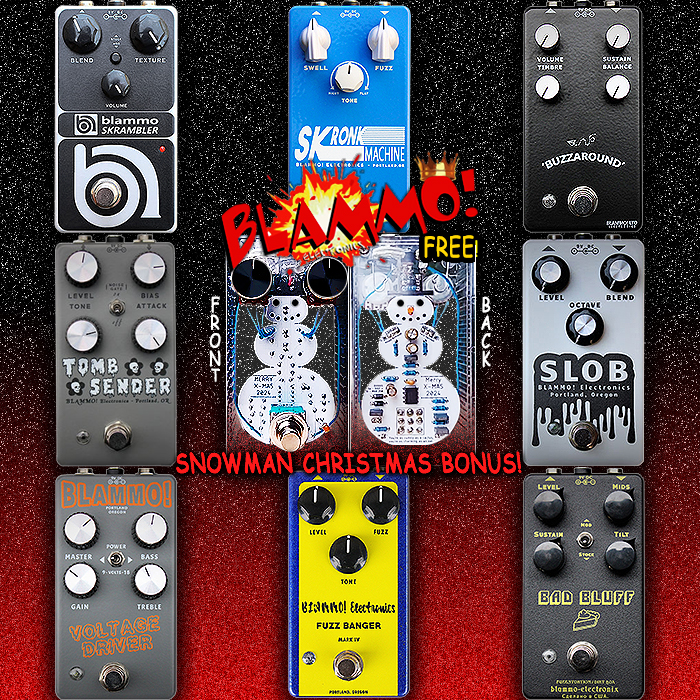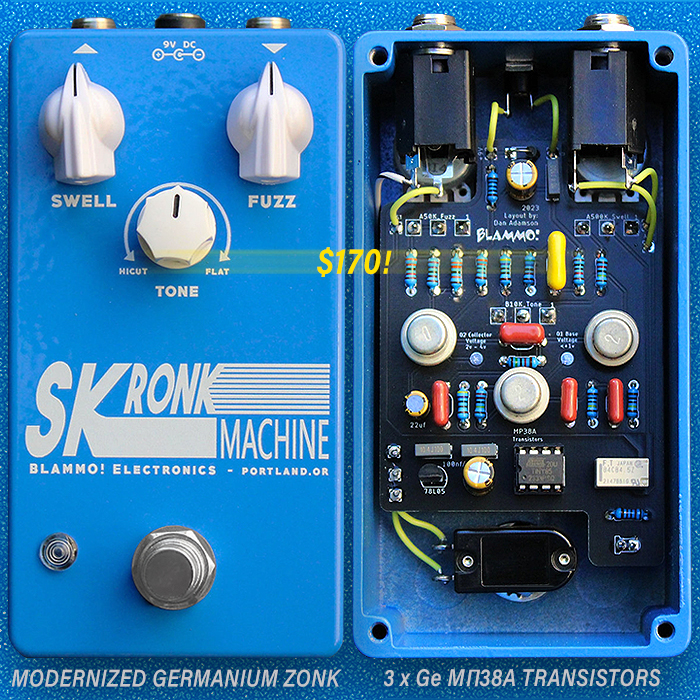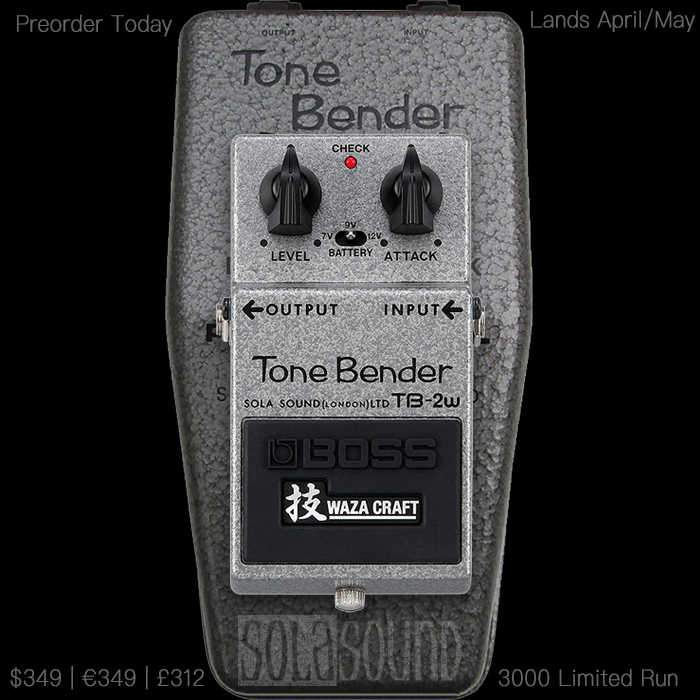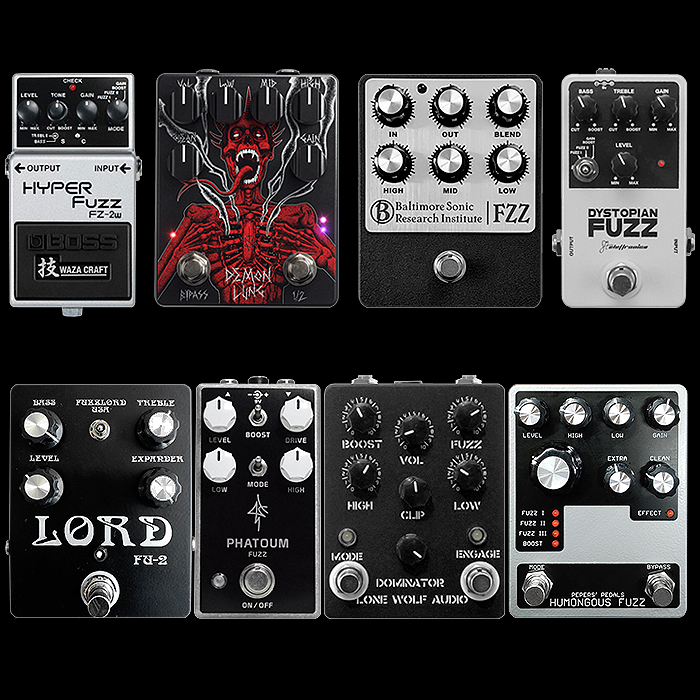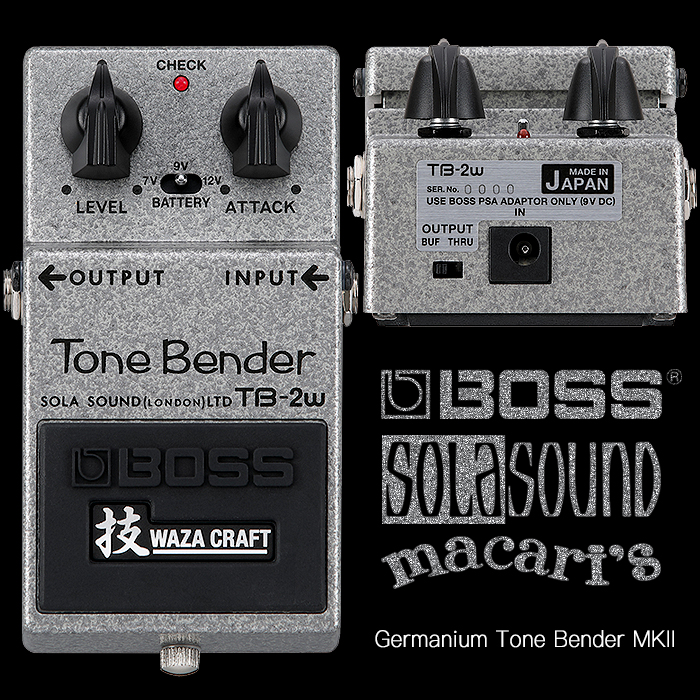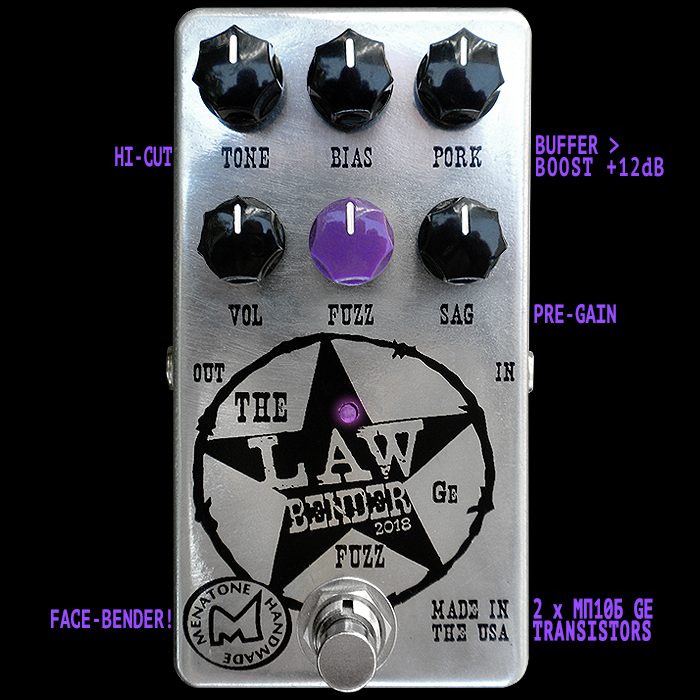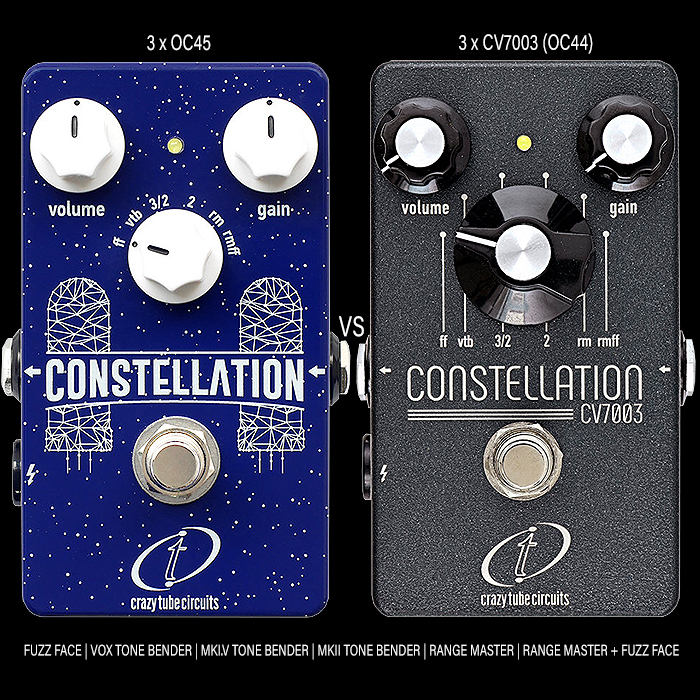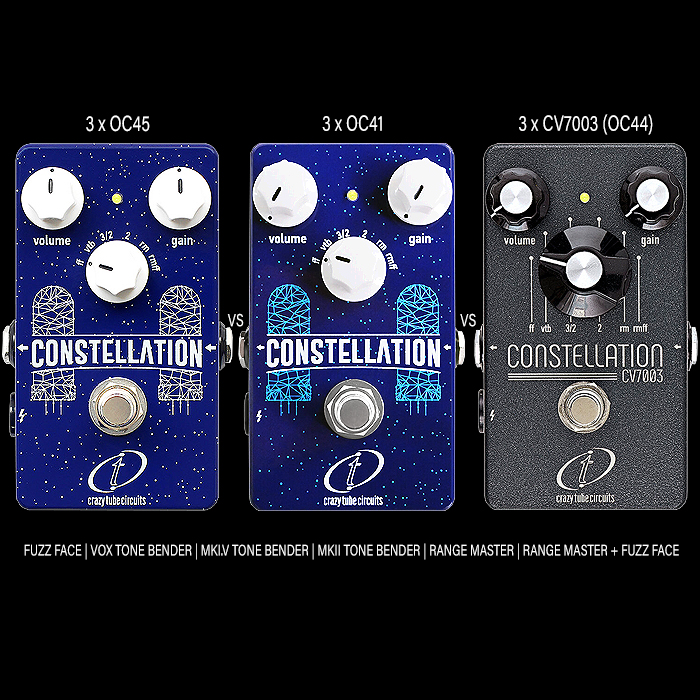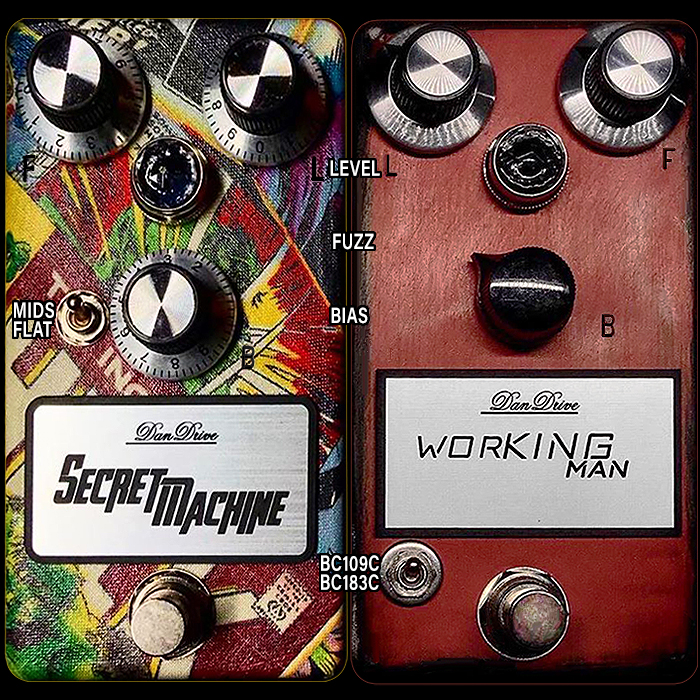12 of the Best Compact Enclosure Zonk Machine Style Fuzz Pedals
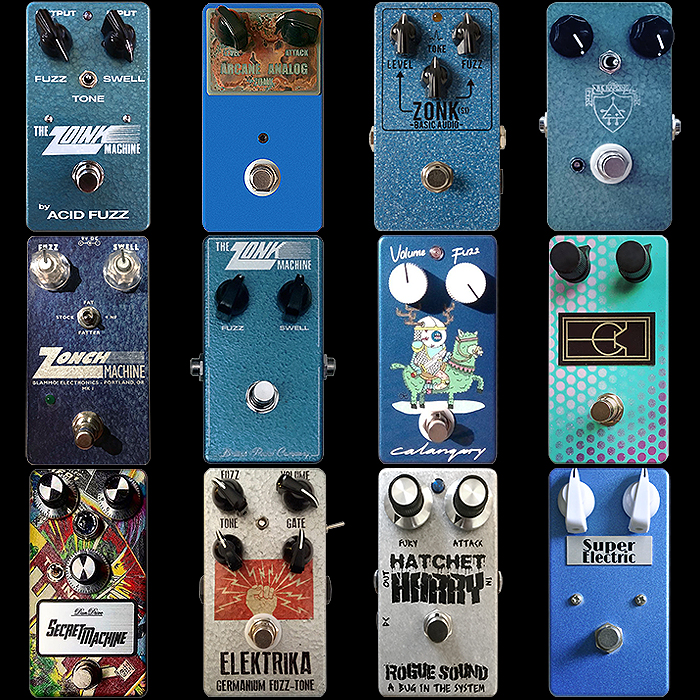
This article was inspired by a series of dialogues I had with my now pal Bruno - about DanDrive Secret and Acid Fuzz Zoink Machine fuzzes initially - but then branched out into a more general conversation about Zonk Machine Fuzzes.
The John Hornby Skewes Zonk Machine was in fact a very closely related MKI Tone Bender style fuzz which emerged very shortly after the appearance of the original Colorsound MKI Tone Bender. In fact the circuits are almost identical - 3 x all germanium transistor fuzzes with just a couple of parts differences. Original Tone Benders had Mullard OC75 + 2 x TI 2G381 transistors, while initial Zonk Machines had A02650 + OC75 + OC44. You often see the glass OC75 transistors associated with these fuzzes - and it’s quite common to see three of those deployed together. John Hornby Skewes later elected to make a more affordable Zonk Machine version II which featured 2 x 2N4061 silicon transistors.
Zonk Machines came in very similar enclosures to the Tone Bender MKI’s with that stepped, slanted, folded steel format, albeit with a hammered sort of silver-blue finish. As mentioned several times on this blog I’m not at all keen on old-school over-sized vintage enclosures - which are simply just too clunky and non-pedalboard friendly for my liking. There are myriad high quality boutique builders making exceptional compact-enclosure versions of those same exact circuits which really are relatively diminutive in size and should not need a vast cavernous receptacle of a box to be relevant. There just seem to be so many people out there that seem to need to buy these kinds of pedals in those original impractical formats - I just don’t really see the point - especially considering what builders like DanDrive can achieve in considerably more compact boxes which can easily slot into and out of your regular touring pedalboard / rig.
The nature and delicacy of these MKI style circuits means that each one has to be tuned and calibrated by ear - which can make them rather pricey when combined with NOS germanium parts - while there is quite a wide range of price points. Some extended-range Zonks and MKI’s can be tuned either way to delivery that sharper more wiry tone of the Zonk - which can also have a rather cool subtle hint of oscillation. As with most things, my preference is for more extended-range examples as I feel that having bias control here in particular can do wonders and can yield so much more versatility. Note that since these pedals are tuned and calibrated by ear there can be a difference from one pedal to the next - different batches often utilise different transistors because of parts availability. And in general some of these can sound right on point with that wiry Zonk character - while others are still in that ballpark, but can tend more towards MKI or even MKII varieties to a degree with somewhat softer accentuation of those higher frequencies.
As widely documented on this blog, my first Zonk Machine variant was a DanDrive Secret Weapon - essentially Dan’s 2nd variant of the all-germanium circuit and following on from his original Secret Engine fuzz. His latest version Secret Machine leans more into the slightly more aggressive side of Doyle Bramhall II’s own original version of the Zonk. The Secret Engine has two knobs and a mid-boost switch, the Secret Weapon had slightly more extended range and an added Bias knob, and the latest incarnation the Secret Machine has the same topology as the Secret Weapon with slightly brighter articulation and more aggression still. I guess I suffered from first-mover disadvantage to a degree, as I would likely have preferred the later / latest model - but I can’t be churlish really as Pete Honore’s demo illustrates just how fantastic my own Secret Weapon edition sounds - which I believe is identical in makeup to Pete’s - but obviously with a different fabric wrap. My Secret Weapon contains 3 x dsi AC127 transistors and as reported sounds fantastic! :
I'm a big fan of Basic Audio obviously and like pretty much everything John Lyons does - so I will for sure be getting the Basic Audio Zonk eventually - a 3-knob Zonk II silicon transistor variety that has been on my wishlist for quite a while now. In the meantime I've ordered the 4-knob / 5 controls JDM Pedals Elektrika - an all-germanium affair, but with unspecified transistors - I can report more on that later. The combination of Tone and Gate knobs and Bass-Cut switch means you easily range between MKI and Zonk style sounds. This looks to be a great variation of this type, and I've been impressed with the demos I've heard.
In my research I identified nearly 20 compact Zonk fuzz varieties - albeit I was caught out as usual by the N1 vs P1 enclosure illusion - and a number of those I originally identified weren't compact at all. A number of these editions are now discontinued and others need to be specially ordered from the respective builder. As always Reverb.com is the best stalking ground for most of these fuzzes - and you just need to play the waiting game whilst applying a number of automatic feed search queries.
I feel the Acid Fuzz Zoink Machine is a little richly priced for my liking at $449, and as mentioned, I'm more in the market for more versatile extended range varieties of this pedal. I've been trying to persuade my good friend Sof at Expresso FX to do his own version of this - we have discussed that over a long period as a possibility. I might very well pick up a Blammo Electronics Zonch Machine I - note that he does both all-germanium and Zonch II silicon varieties - so beware of which exact version you are acquiring. If you have the funds and the patience - then by all means spring for a DanDrive Secret Machine which is simply one of the very best Zonks around - it is pricey though, and there is am exceedingly long waiting list now!
Here follow the details of the runners and riders! :
Acid Fuzz Zoink Machine - $449
This was one of the two pedals I was originally discussing with my pal Bruno. Bruno indicated that the price has gone up recently - possibly in line with what's happening with the DanDrive varieties. Provenance here is solid with these coming as 1 x 2G374 / 2N1379 + 2 x OC75 / OC71 varieties. So pretty spot on in the parts department. The 3-way Tone switch gives you Mids boost to the left, default Zonk in the middle, and full-frequency to the right - i.e. closer to a MKI. This is a really decent pedal for sure, and now at near enough the same price as the DanDrive Secret Weapon/Machine. I personally prefer the look and extended range of my Secret Weapon, or the newer Secret Machine. But obviously there are plenty of fans of this Zoink too as its batches sell out pretty quickly! So most definitely a contender.
Arcane Analog Zonk - c$200+ POA
This seems to have been a sort of one-off to a degree and is not referenced in the current core Arcane Analog range - but I'm pretty sure you can put in a request to this Canadian builder. Great sounding 3 x OC75 variety with Level and Attack controls. I would of course like to see a Bias control here also - but there's no doubt that this is a great sounding example of the genre. Swipe the above Instagram reference forwards for the demo video!
Basic Audio Zonk (II / Silicon) - $180
As noted, a Zonk II variety, yet seemingly with a trio of silicon transistors - possibly utilising John Lyons' favourite BC549B transistors - from a gutshot I can see two TO-92 plastic casing transistors but not their designation, while a third 2N3439 TO-18 style metal can is clearly visible! This is definitely a pedal I will be getting eventually, and is one of a series of Basic Audio varieties still on my ongoing acquisitions wishlist. I just really love John Lyons' take on most fuzz circuits, and the 3rd Tone control here is essential for dialling in some extended range. A very well behaved and well-calibrated silicon variety of Zonk Machine - possible not for the purists, but a pretty sterling example nonetheless.
B.G. Harding Baby Zonk - £199
UK builder Christopher Harding - whom I've only comes across peripherally before - has a cool range of great sounding vintage UK fuzzes in modern enclosures - including this compact format Baby Zonk. He also makes a larger BB-enclosure Zonk Machine variety, but I'm all about the compact pedalboard-friendly enclosures. The Baby Zonk has a 3-way tone switch not dissimilar to the above Zoink Machine, it also relies on an internal gain trimpot for germanium transistor fine-tuning. This is another all-germanium affair - from the gutshot looks like a mix of different designation and origination transitors, including distinct Russian MP13B (МП13Б) flying-saucer style metal-cans - and I can certainly pick out a CV7354 in one of the example gutshots, while the builder states that a variety of germanium transistors are utilised - and it's the parts values that are key. Most of Christopher's pedals come in the rawer grey style of enclosures with simple stamped brand logo. I really like his slightly rarer silver-blue variants as pictured above - which is likely from a more custom batch. All of Christopher's pedals are currently listed as sold out on his website - but I'm pretty sure he takes in regular orders and commissions.
Blammo Electronics Zonch Machine I - $160
This Portland, Oregon builder has a significant Reverb.com shop presence and features both MKI germanium and MKII silicon Zonk Machine varieties - which here are named 'Zonch Machine' - with a $20 premium on the all-germanium version. This is a very reasonably priced variety and batches seem to sell out pretty quickly. Transistors utilised tend to be 3 x 2SD352 types, and the pedal features tropical fish caps too. The silicon variety has a 2-way Vintage/Modern switch, while the germanium variety has a 3-way Fat/Stock/Fatter toggle-switch - with the Fat/Fatter varieties moving you more toward a MKI Tone Bender direction. Tone-wise these aren't necessarily as zingy and wiry as some of the others here - which is the more classic Zonk tonality - but these still sound pretty great in their own way - and are good value overall.
British Pedal Co. Compact Zonk Machine - £229
Most are familiar with the British Pedal Company by now - which has both Vintage big-box takes on the originals, as well as the more modern and practical Compact Series - from which the above is taken. A common criticism of the British Pedal Co. is its somewhat lack of transparency - where it seems rather loathe to share the actual parts specifications of its pedals. I can understand that numerous varieties of germanium transistors are hard to come by and limited to batches - but surely you can provide a range of possibilities or previous examples. Here they give you nothing beyond the '3 transistors' general description - oddly they don't even specify '3 germanium transistors' while they do say 'detailed replicas'. As a Brand Strategist and Marketing Specialist I have something of an issue with the very loosely defined language used here - it really does not inspire confidence. Pedals look and sound decent enough in that straight-laced clone / replica vein - but I would be concerned that I didn't really know what I was getting into here!
Calangary Pedals Zaladin Fuzz - discontinued - Rp 550,000 / £30 / $37
This might just be an interesting foot note to this selection as Indonesian brand Calangary Pedals, run by one Deris Khariza, seems to have passed into history back in 2017. For a couple of years or so they made these really cool 1 x OC75 + 2 x OC44 Zonk Machines - pretty close clones really circuit-wise - and at a pretty stellar price. Possibly not as wiry and aggressive as some would want - the fuzz's output rather has quite a lot of warmth to it - it is nonetheless a great sounding fuzz made from great components. And super cheap if you can get your hands on one. Time to hit up your Indonesian friends if you have any - possibly I should check in with Jesse at GFI System to see if he can spot one for me! No traction so far on either Reverb.com or Ebay!
Collector Effectors Zonk Machine - $POA
Patrick Brown of Collector Effectors seems to be relatively newly minted as such with an Instagram and Facebook presence just going back to May this year! In that short time though he's really laid down his credentials as a boutique builder and has established a pretty distinctive signature look with a graduated dots design and colour-matched knobs. I actually really like his aesthetic - it's always tricky to come up with something sufficiently distinct and different and I feel Patrick has produced something that really works. These seem to be mostly private commissions thus far arranged via Instagram - with scant details of pricing or component use - apart from this being an all-germanium variety. Certainly something with appealing looks - albeit I would want to see some sort of bias or tone control here too ideally.
DanDrive Secret Machine - €339 - €467
As I mentioned in the intro - my own Secret Weapon variant is a wonderful example of the genre - featuring 3 x dsi AC127 transistors and including that 3rd bias knob and Mids boost switch. The latest Secret Machine edition has brighter articulation and more aggression but besides a variety of different cloth wraps - it's overall looks and function are identical to the Secret Weapon. In most ways I think this is still the one to beat as such - and understandably there is a long waiting list on this. Prices seem to be all over the place too - with core RRP still seemingly €339, priced £337 in the UK, and as much as €399 in USA / Canada and even €467 equivalent courtesy of Sweden's 'These Go To 11' - they obviously include the price in that metaphor too!
JDM Pedals Elektrika Fuzz - MKI / Zonk - $149
This is my latest acquisition here - and Joe Doc has these on a 3-week turnaround currently - so mine should be in before the end of this month in theory! The germanium transistors are not specified as Joe works specifically by parts values and for germanium transistor supply can be highly variable. This is actually both an MKI and Zonk as afforded by those two extra dials - Tone and Gate but also a Tight/Fat switch - with those you can easily switch between MKI and Zonk sound signatures - and both Tone and Gate yield a very wide range of tones and textures. A really smart pedal all-round - and just the sort of thing I seek out. I've had my eye on Joe Doc's Union Fuzz too - and included his Little Steamer in my Harmonic Percolator roundup - all really decent fuzzes - and no doubt I will have a couple more of his in the collection at some stage.
Rogue Sound Hatchet Harry (II / Silicon) - discontinued - c£135 on Reverb.com
Rogue Sound was an offshoot of D*A*M - featuring pedals made by one of David Main's circuit engineers Linzi. Only three varieties were produced - including this Hatchet Harry Zonk II version. Excellent D*A*M quality and made as usual with the finest components - which here are silicon variety transistors. These occasionally appear on Reverb.com and are a decent proposition for that silicon Zonk II sound. I personally prefer the slight advantage of Basic Audio's 3rd Tone knob - but there is no doubt that the Hatchet Harry is a great sounding pedal too. The kind of pedal I would snap up if one appeared at a reasonable price on Reverb.com - and of course at the right time!
Super Electric Zonk - £137
I'm delighted that I can at last include one of Ireland's Jimmy Behan's pedals. I've been aware of him for a while, and have had quite a few requests to include some of his output in my roundups - and here we find a perfect pick. Jimmy has a very active shop on Reverb.com with quite an extensive range of fuzz and drive pedals - all handmade with the finest components and priced very reasonably. Right at this minute there is no Super Electric Zonk up for sale on the shop - but you can always contact Jimmy direct via his website and make a request/ commission. Another pretty faithful compact circuit replica - all-germanium, while as always I would prefer to see a third Tone or Bias knob here for added versatility. I was unable to find a demo/video of the Zonk variety - so have elected to show a demo of Jimmy's MKI - which is obviously in the same sort of ballpark!
Final Thoughts
This article actually took quite a while longer than expected - particularly on the research-front - it takes quite a while to track down suitable/viable examples and find all the pertinent details and references to support their selection. There were a number I spotted which I thought qualified but which then turned out to be the significantly larger P1 style enclosures. Other brands seemed to have some prototypes out, but no concrete final edition - and often scant to no details via some throwaway Instagram mention. Finding suitable images is always problematic - and it takes a lot of effort in PhotoShop to get everything sufficiently consistent to fit into these visuals.
At one stage it looked like I was heading for 18 examples, then 15, and finally 12 that I could use! I still quite like the look of the Acid Fuzz Zoink Machine - but it's not going to outgun my DanDrive Secret Weapon really - and I don't feel I need two really pricey examples. My latest addition is the JDM Elektrika - which I'm really looking forward to receiving hopefully before the end of this month. I will also most definitely be acquiring a Basic Audio Zonk at some stage too - I might snap some of these others up if the opportunity presents itself at the right time - a Blammo Zonch Machine for instance. And I'd really like to track down a Calangary Zaladin however tricky that might prove.
As mentioned several times here - I'm more on the lookout for extended range varieties really - and I would want to see more of the varieties with a 3rd Bias or Tone knob. I will also be keeping an eye on Patrick Brown of Collector Effectors as I really like his rather fresh approach.
I still think that overall the DanDrive Secret varieties are probably the ones to beat here - if you have the patience and funds for one of those. The other top-tier example here is the Acid Fuzz Zoink Machine - but it's not quite as appealing to me. I would still probably largely recommend the trio I will end up getting - including the Basic Audio Zonk as a representative of the Zonk II silicon variety - although I really kind of want the Rogue Sound Hatchet Harry too! While I also really like the sound of the B.G. Harding and Jimmy Behan / Super Electric varieties.
What say all of you? Anything here that takes your fancy besides the obvious!?

